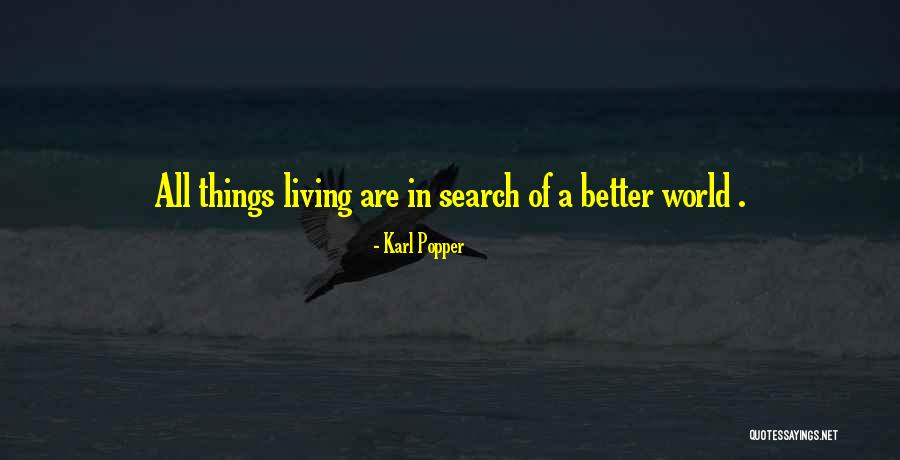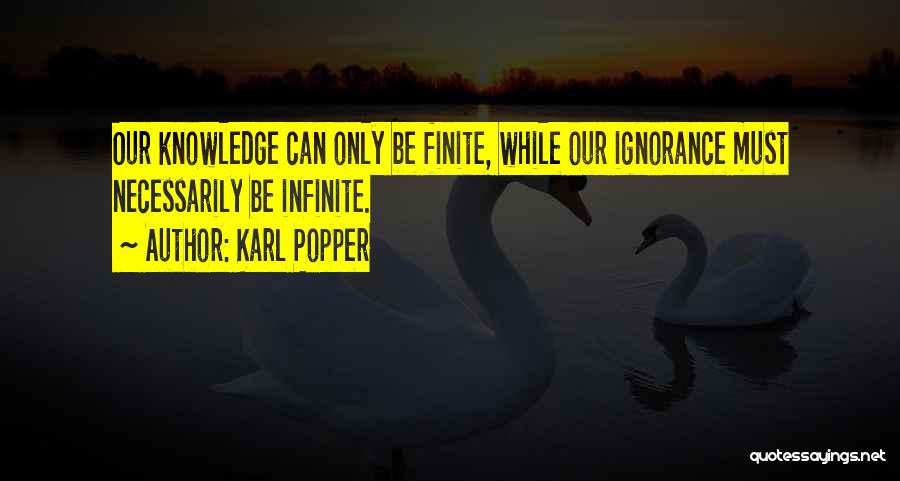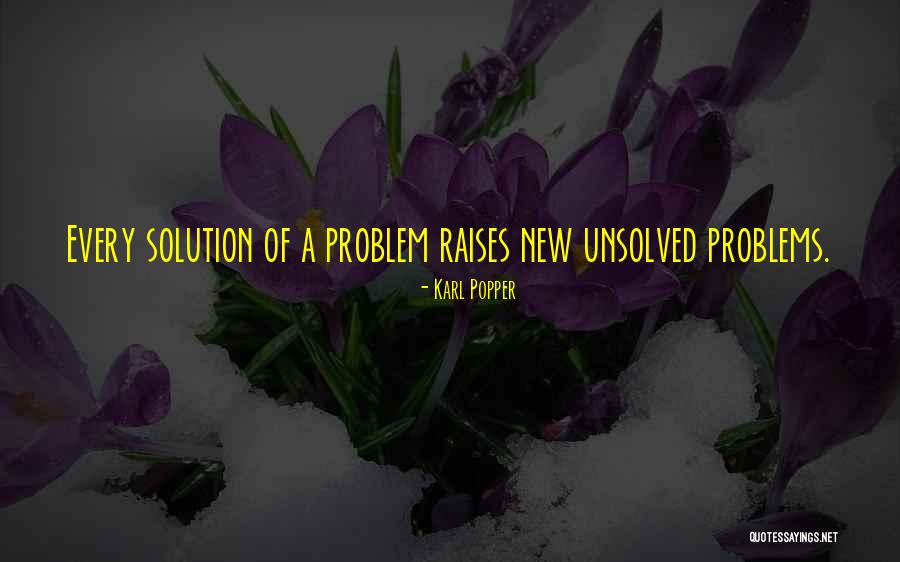Karl Popper Quotes & Sayings
Enjoy the top 100 famous quotes, sayings and quotations by Karl Popper.
Famous Quotes By Karl Popper

It is wrong to think that belief in freedom always leads to victory; we must always be prepared for it to lead to defeat. If we choose freedom, then we must be prepared to perish along with it. — Karl Popper
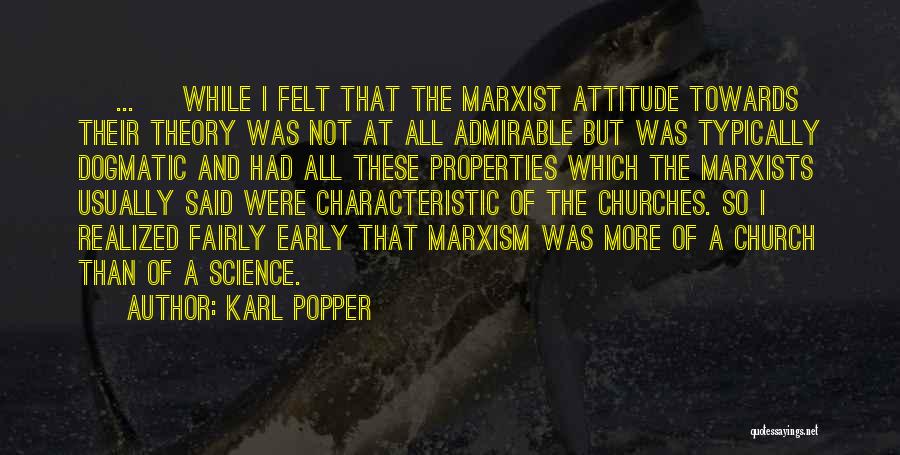
[ ... ] while I felt that the Marxist attitude towards their theory was not at all admirable but was typically dogmatic and had all these properties which the Marxists usually said were characteristic of the churches. So I realized fairly early that Marxism was more of a church than of a science. — Karl Popper
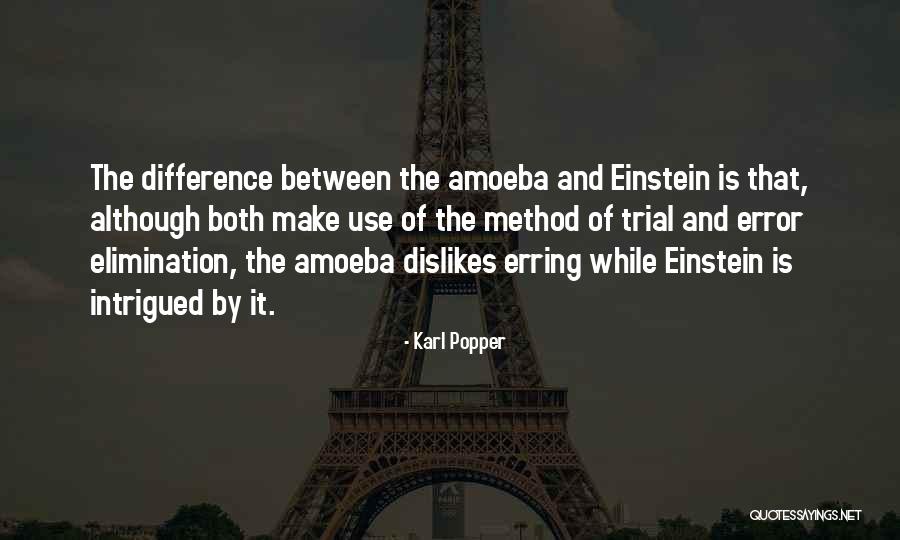
The difference between the amoeba and Einstein is that, although both make use of the method of trial and error elimination, the amoeba dislikes erring while Einstein is intrigued by it. — Karl Popper
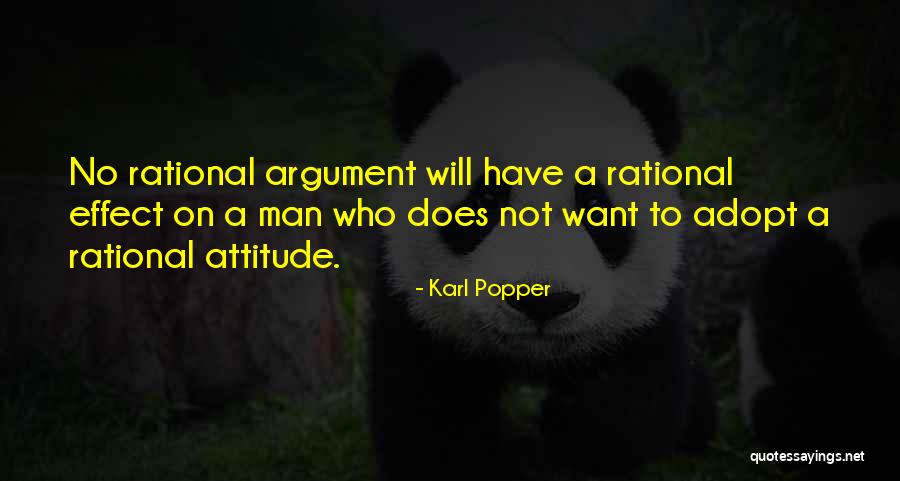
No rational argument will have a rational effect on a man who does not want to adopt a rational attitude. — Karl Popper
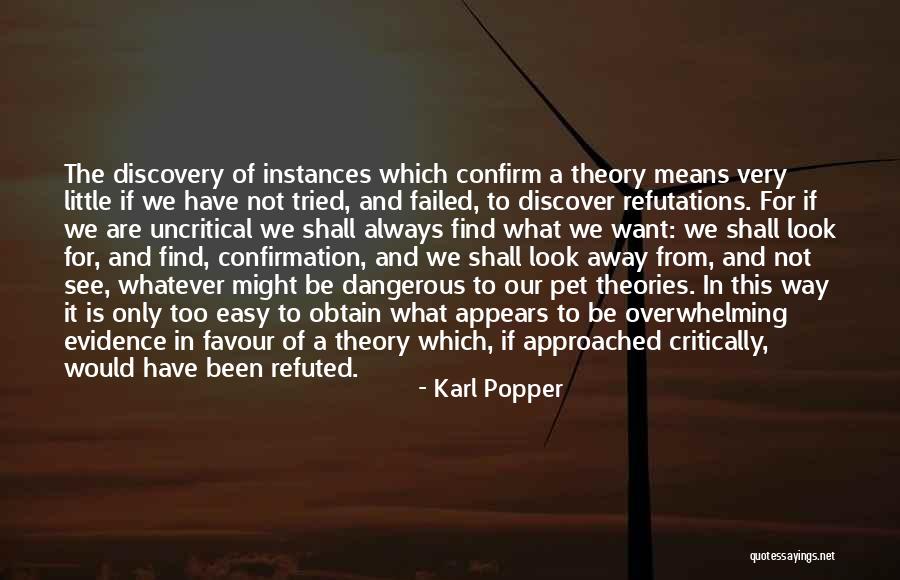
The discovery of instances which confirm a theory means very little if we have not tried, and failed, to discover refutations. For if we are uncritical we shall always find what we want: we shall look for, and find, confirmation, and we shall look away from, and not see, whatever might be dangerous to our pet theories. In this way it is only too easy to obtain what appears to be overwhelming evidence in favour of a theory which, if approached critically, would have been refuted. — Karl Popper
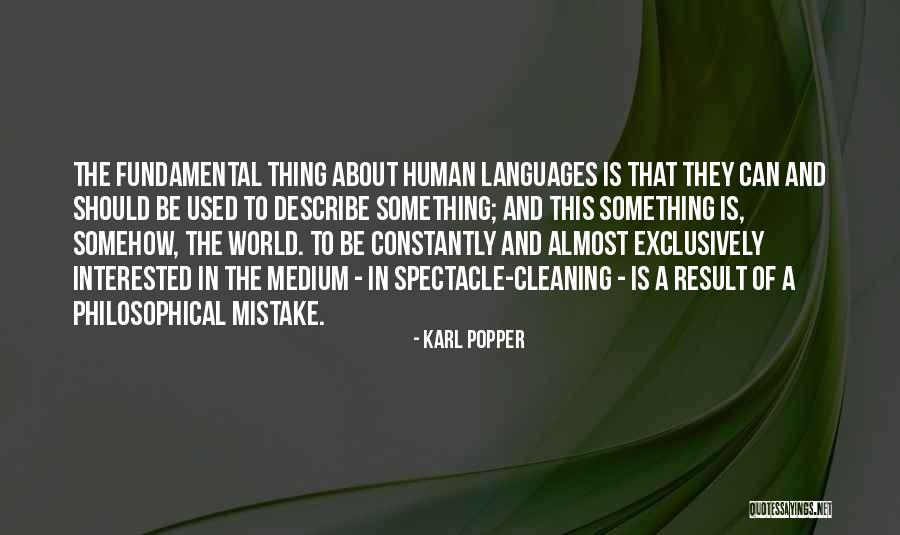
The fundamental thing about human languages is that they can and should be used to describe something; and this something is, somehow, the world. To be constantly and almost exclusively interested in the medium - in spectacle-cleaning - is a result of a philosophical mistake. — Karl Popper
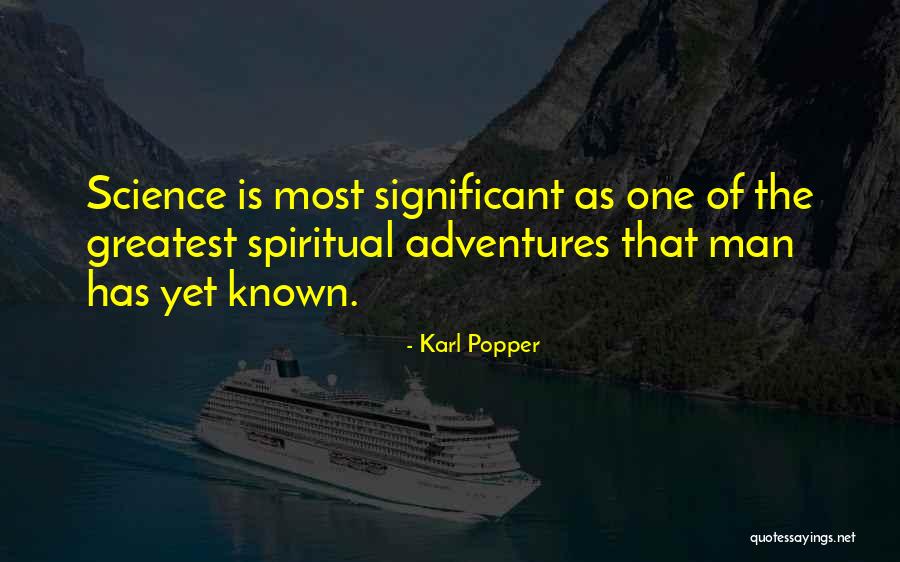
Science is most significant as one of the greatest spiritual adventures that man has yet known. — Karl Popper
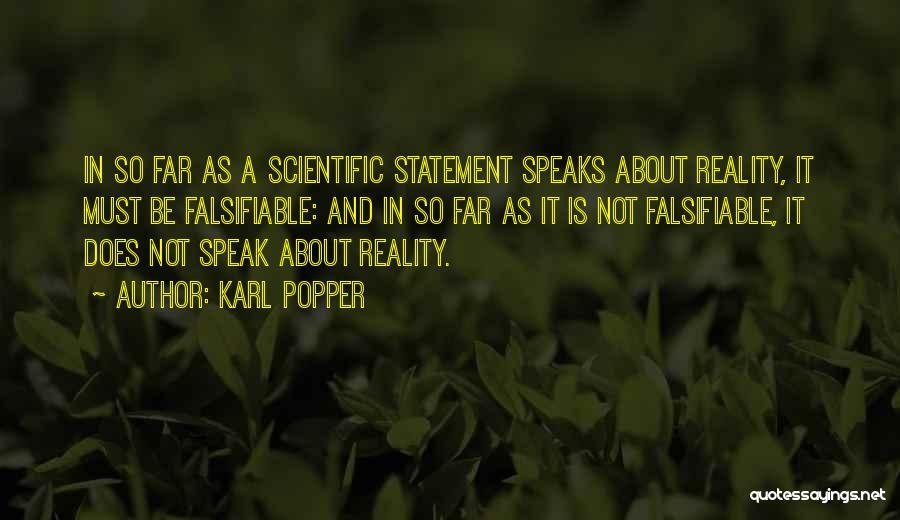
In so far as a scientific statement speaks about reality, it must be falsifiable: and in so far as it is not falsifiable, it does not speak about reality. — Karl Popper
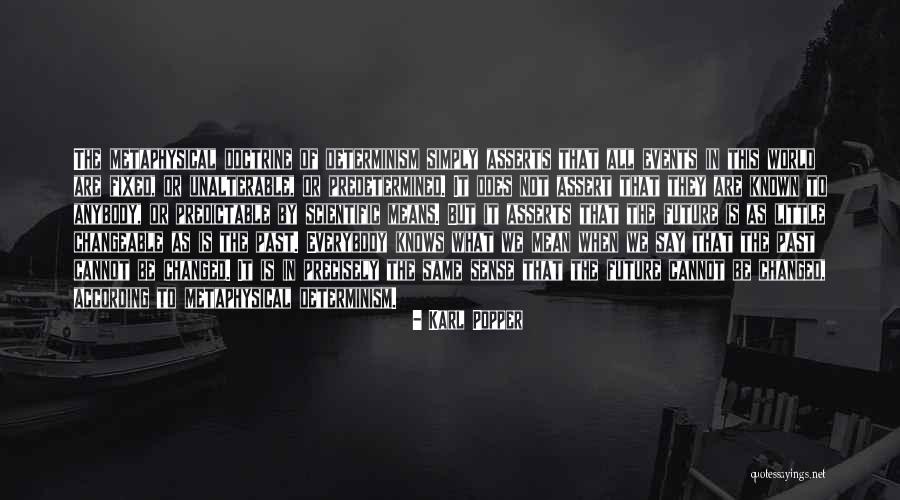
The metaphysical doctrine of determinism simply asserts that all events in this world are fixed, or unalterable, or predetermined. It does not assert that they are known to anybody, or predictable by scientific means. But it asserts that the future is as little changeable as is the past. Everybody knows what we mean when we say that the past cannot be changed. It is in precisely the same sense that the future cannot be changed, according to metaphysical determinism. — Karl Popper
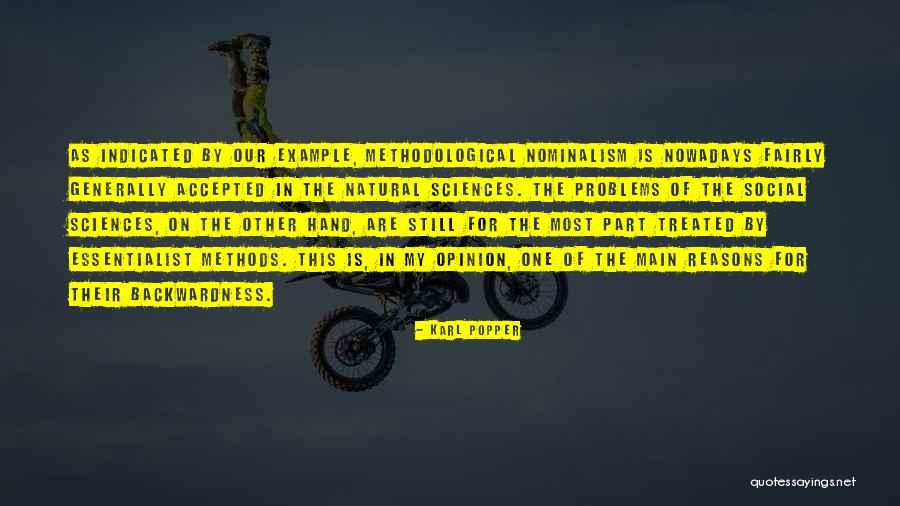
As indicated by our example, methodological nominalism is nowadays fairly generally accepted in the natural sciences. The problems of the social sciences, on the other hand, are still for the most part treated by essentialist methods. This is, in my opinion, one of the main reasons for their backwardness. — Karl Popper
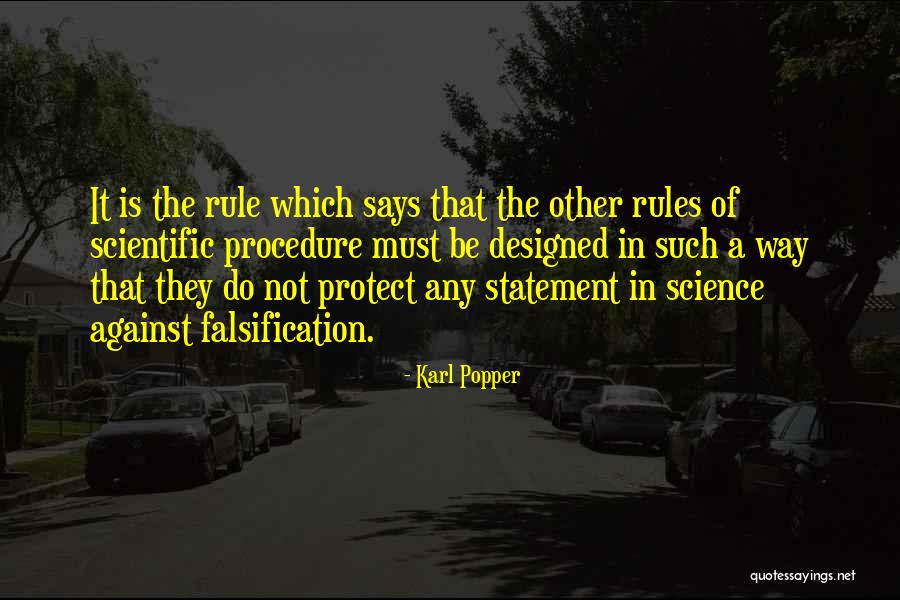
It is the rule which says that the other rules of scientific procedure must be designed in such a way that they do not protect any statement in science against falsification. — Karl Popper
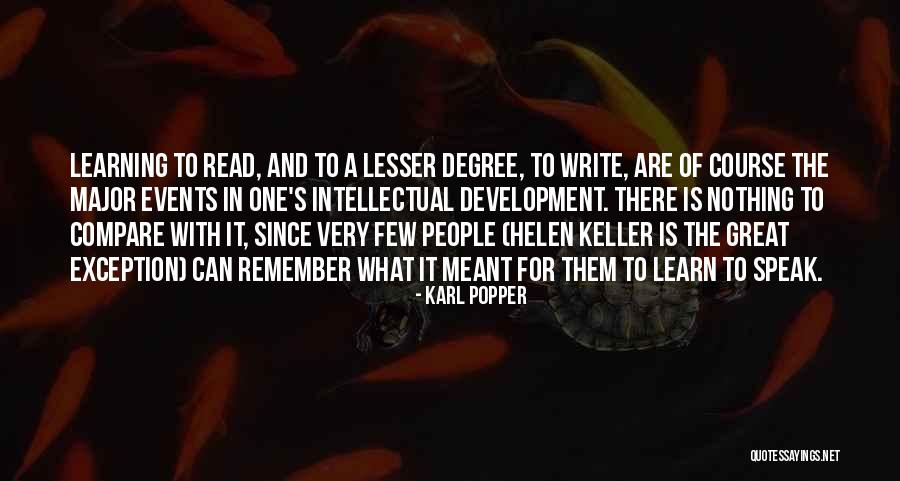
Learning to read, and to a lesser degree, to write, are of course the major events in one's intellectual development. There is nothing to compare with it, since very few people (Helen Keller is the great exception) can remember what it meant for them to learn to speak. — Karl Popper
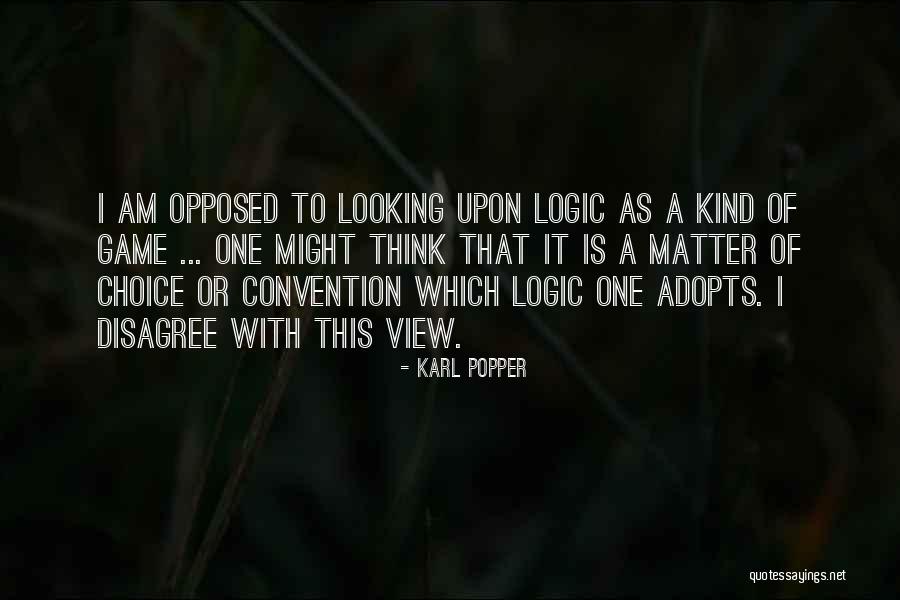
I am opposed to looking upon logic as a kind of game ... One might think that it is a matter of choice or convention which logic one adopts. I disagree with this view. — Karl Popper
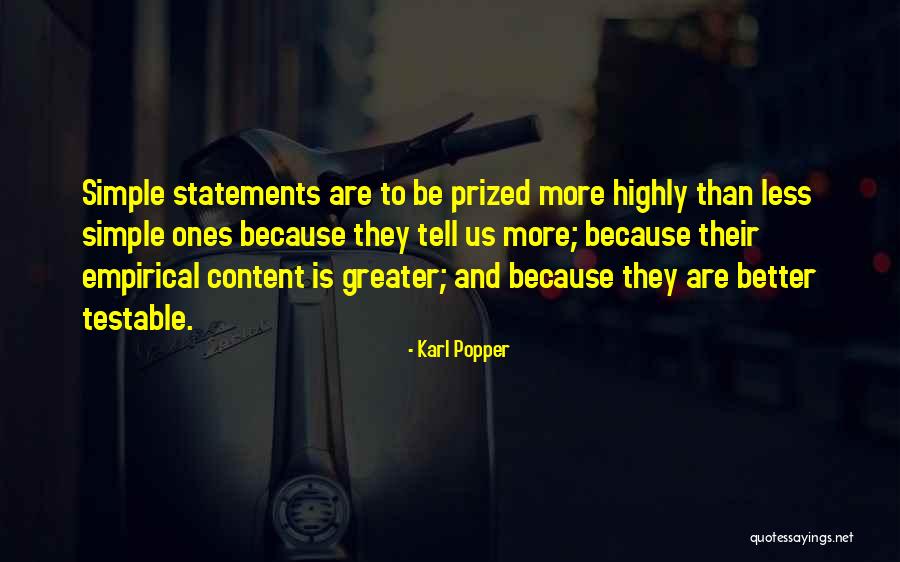
Simple statements are to be prized more highly than less simple ones because they tell us more; because their empirical content is greater; and because they are better testable. — Karl Popper
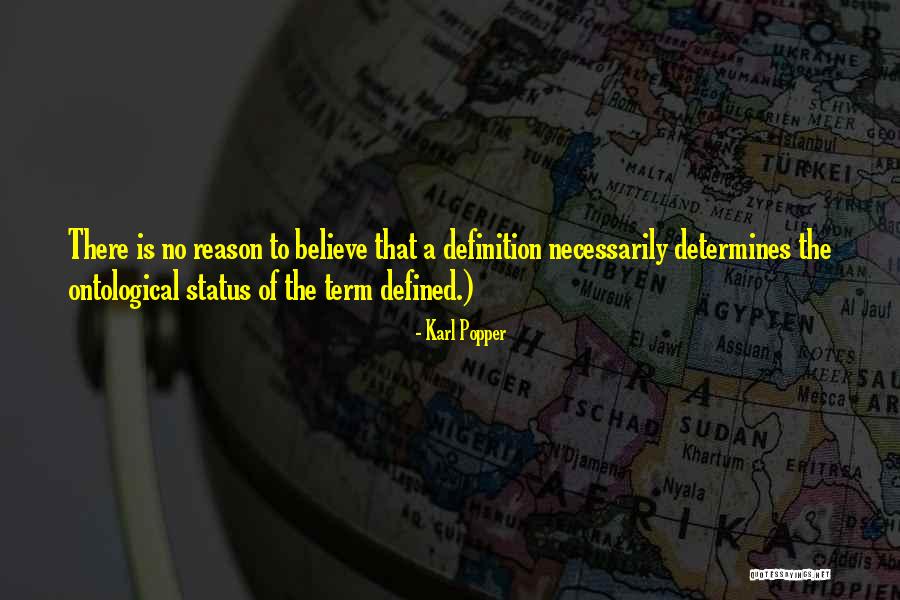
There is no reason to believe that a definition necessarily determines the ontological status of the term defined.) — Karl Popper
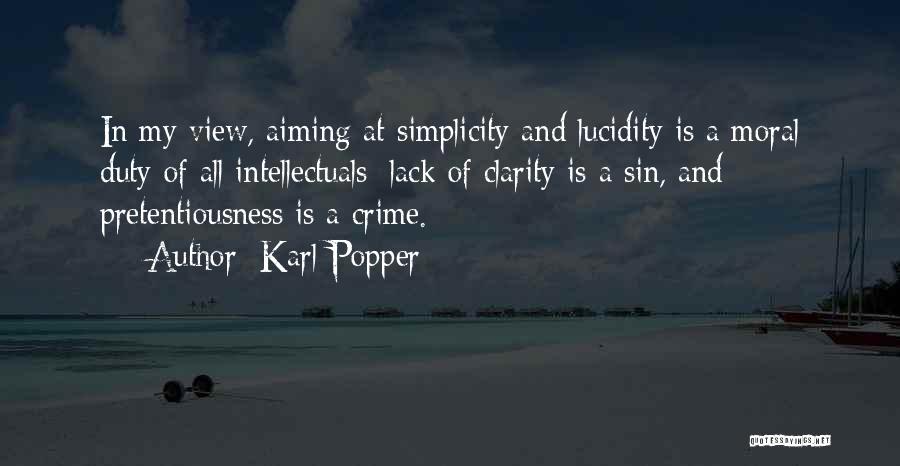
In my view, aiming at simplicity and lucidity is a moral duty of all intellectuals: lack of clarity is a sin, and pretentiousness is a crime. — Karl Popper
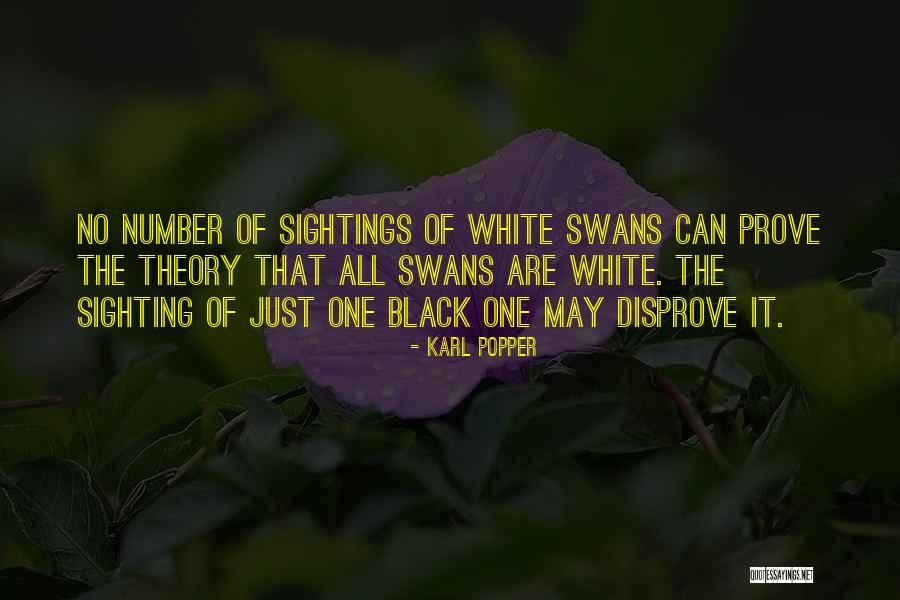
No number of sightings of white swans can prove the theory that all swans are white. The sighting of just one black one may disprove it. — Karl Popper
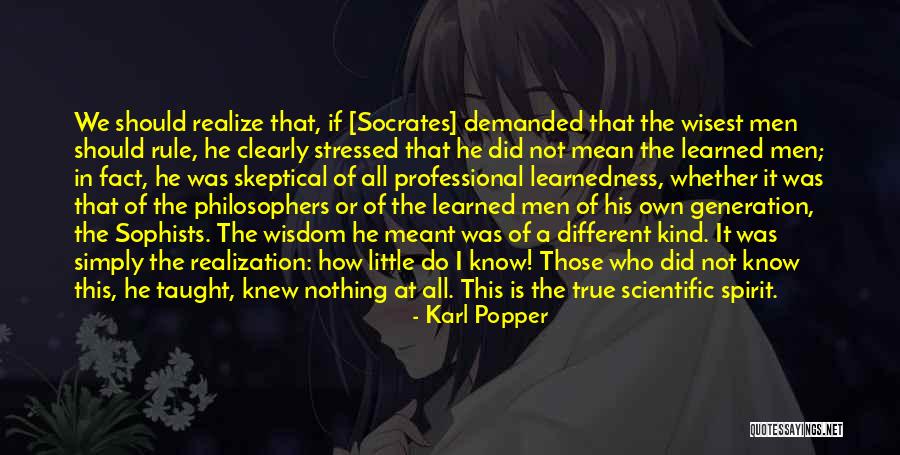
We should realize that, if [Socrates] demanded that the wisest men should rule, he clearly stressed that he did not mean the learned men; in fact, he was skeptical of all professional learnedness, whether it was that of the philosophers or of the learned men of his own generation, the Sophists. The wisdom he meant was of a different kind. It was simply the realization: how little do I know! Those who did not know this, he taught, knew nothing at all. This is the true scientific spirit. — Karl Popper
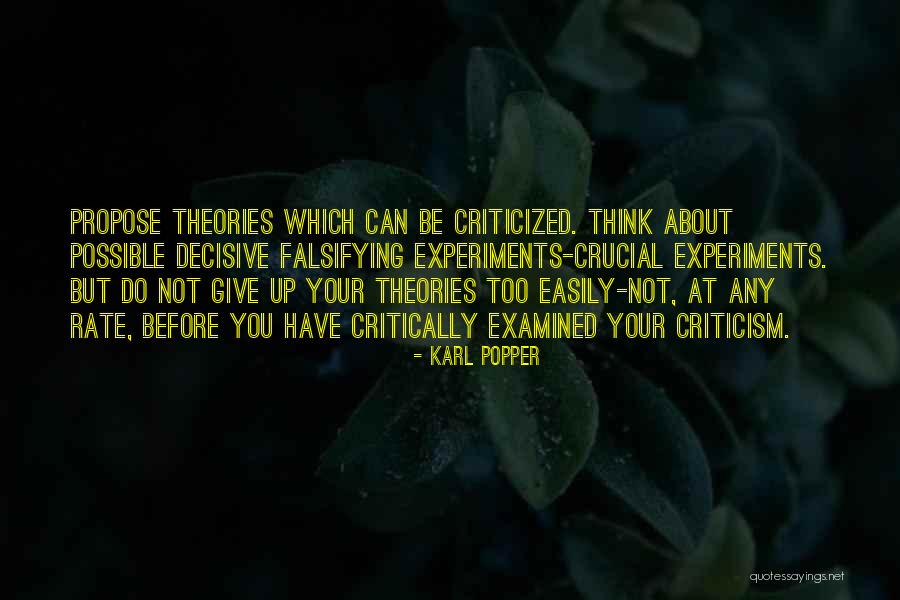
Propose theories which can be criticized. Think about possible decisive falsifying experiments-crucial experiments. But do not give up your theories too easily-not, at any rate, before you have critically examined your criticism. — Karl Popper
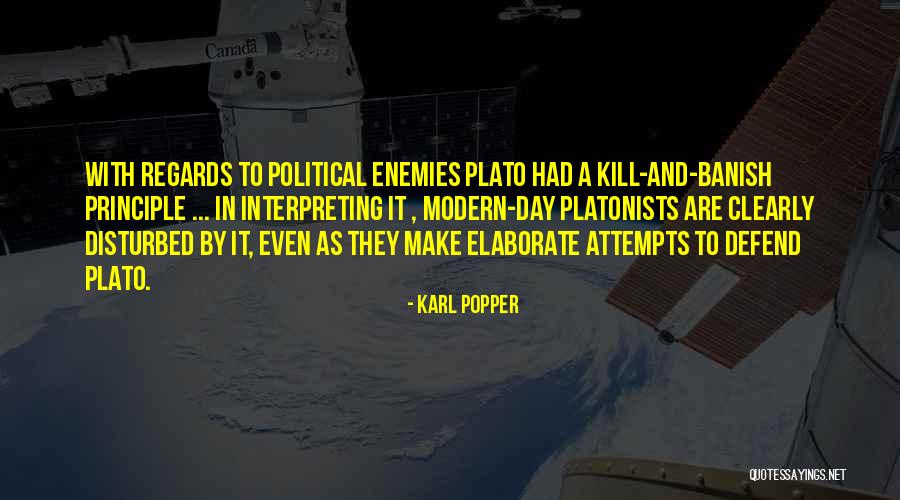
With regards to political enemies Plato had a kill-and-banish principle ... In interpreting it , modern-day Platonists are clearly disturbed by it, even as they make elaborate attempts to defend Plato. — Karl Popper
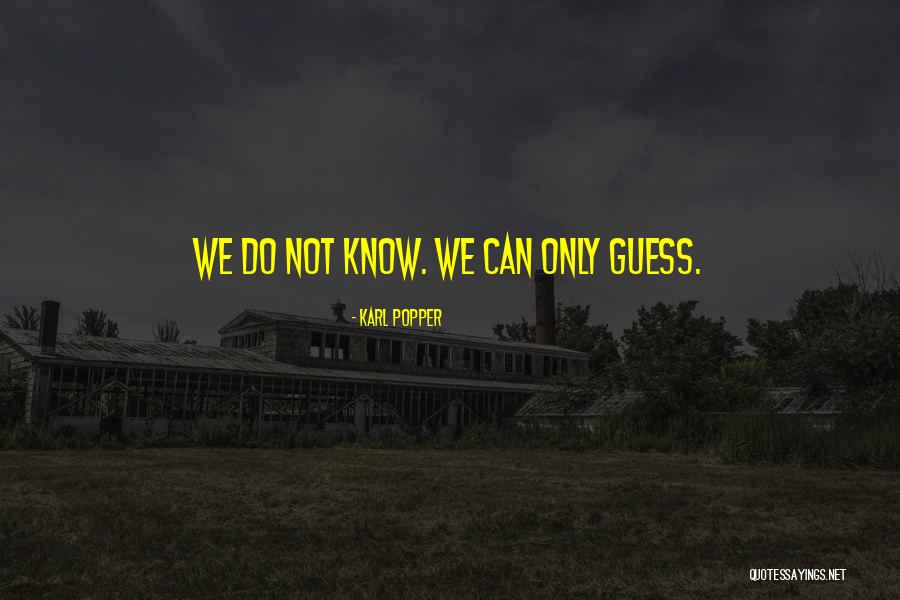
We do not know. We can only guess. — Karl Popper
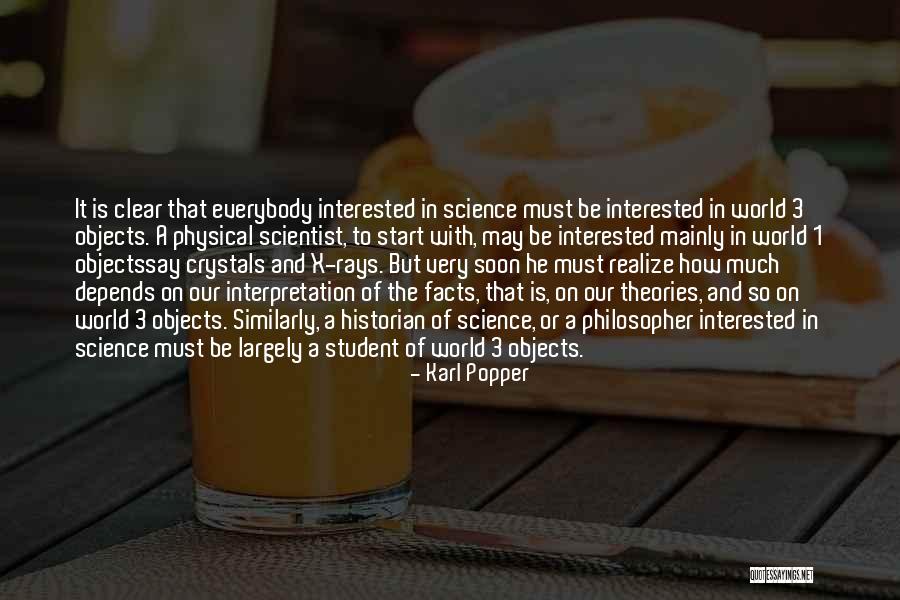
It is clear that everybody interested in science must be interested in world 3 objects. A physical scientist, to start with, may be interested mainly in world 1 objects
say crystals and X-rays. But very soon he must realize how much depends on our interpretation of the facts, that is, on our theories, and so on world 3 objects. Similarly, a historian of science, or a philosopher interested in science must be largely a student of world 3 objects. — Karl Popper
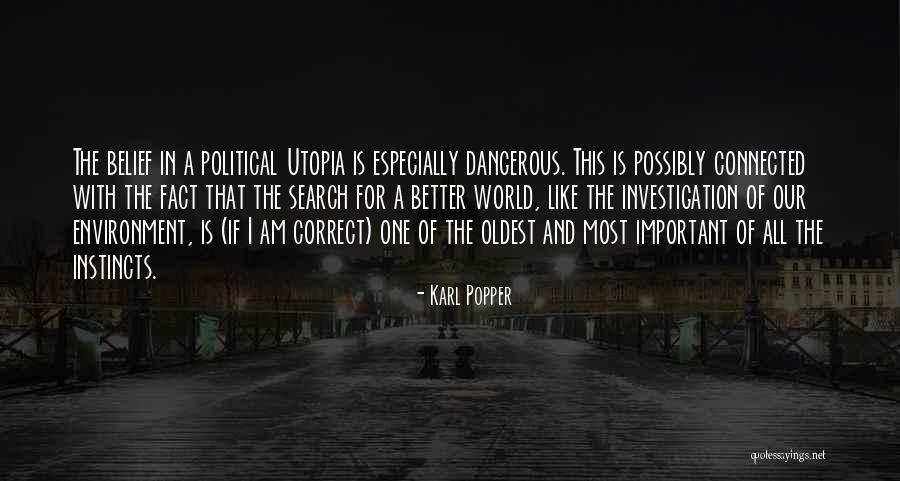
The belief in a political Utopia is especially dangerous. This is possibly connected with the fact that the search for a better world, like the investigation of our environment, is (if I am correct) one of the oldest and most important of all the instincts. — Karl Popper
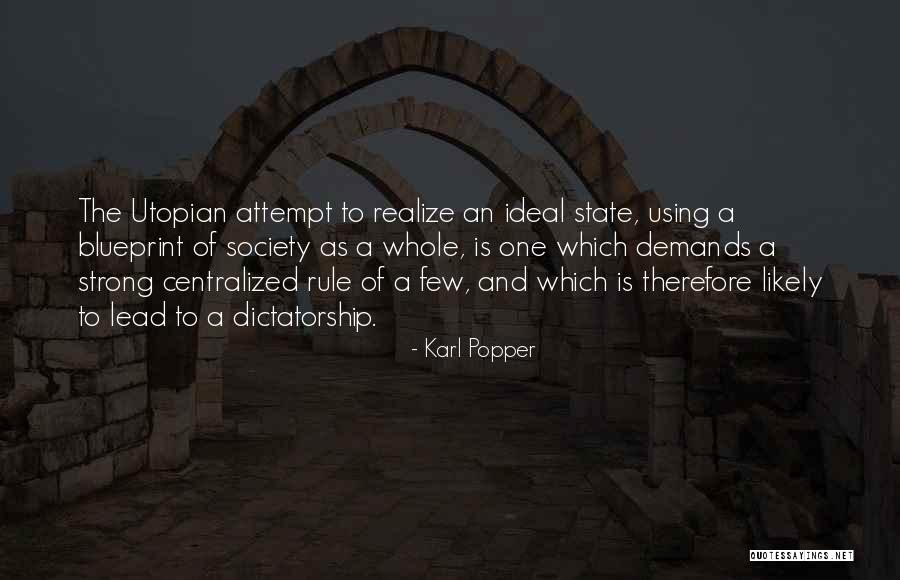
The Utopian attempt to realize an ideal state, using a blueprint of society as a whole, is one which demands a strong centralized rule of a few, and which is therefore likely to lead to a dictatorship. — Karl Popper
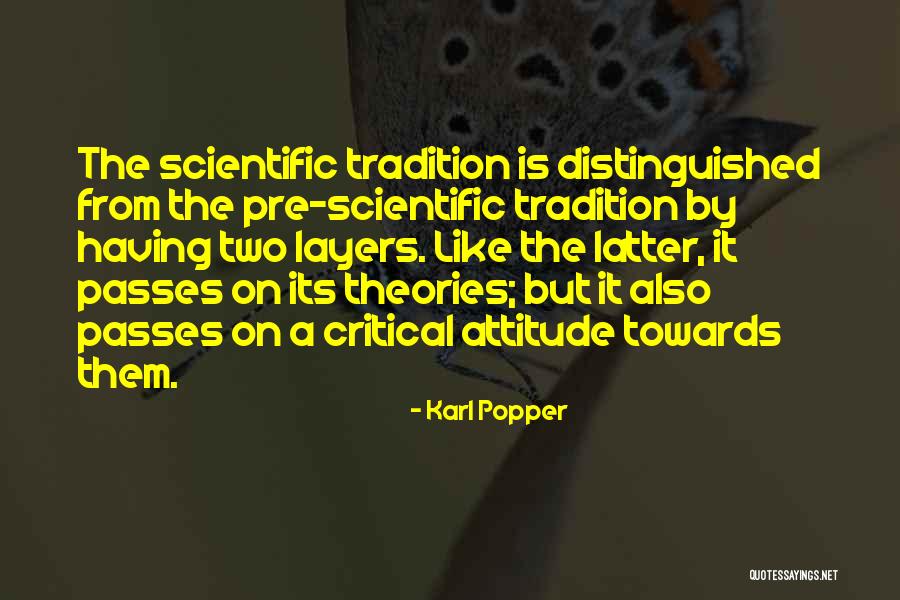
The scientific tradition is distinguished from the pre-scientific tradition by having two layers. Like the latter, it passes on its theories; but it also passes on a critical attitude towards them. — Karl Popper

There is no history, only histories. — Karl Popper
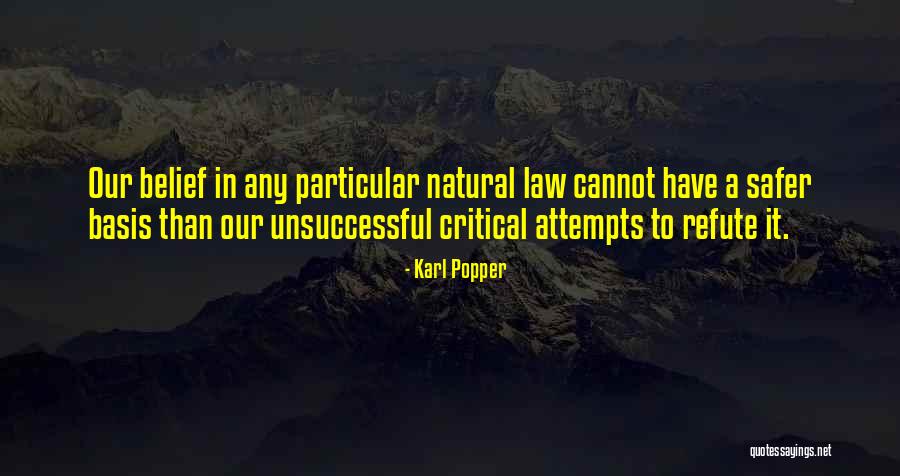
Our belief in any particular natural law cannot have a safer basis than our unsuccessful critical attempts to refute it. — Karl Popper
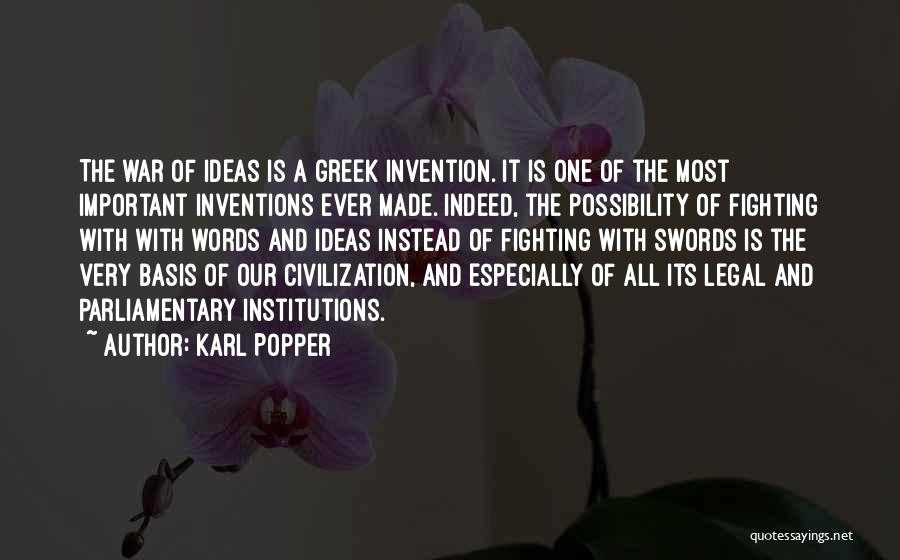
The war of ideas is a Greek invention. It is one of the most important inventions ever made. Indeed, the possibility of fighting with with words and ideas instead of fighting with swords is the very basis of our civilization, and especially of all its legal and parliamentary institutions. — Karl Popper
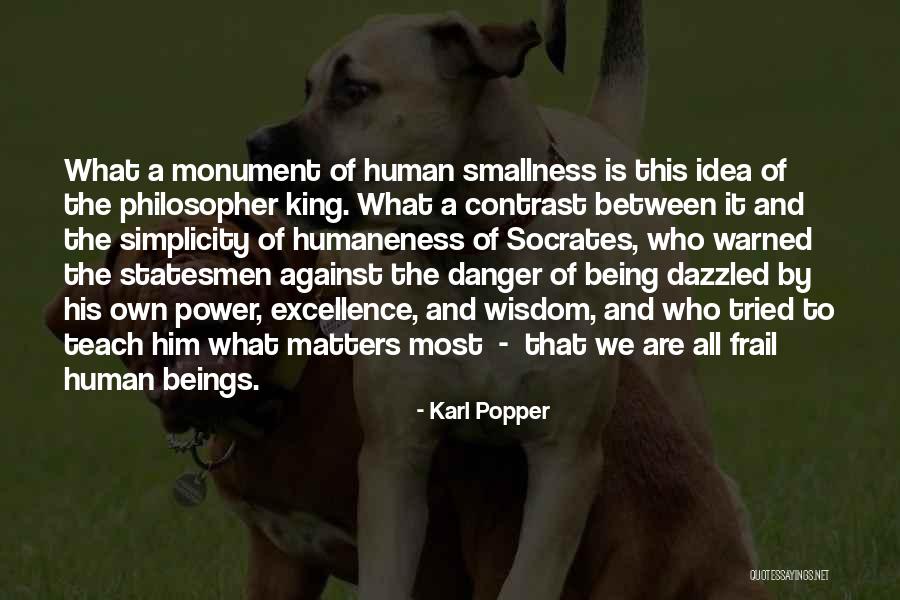
What a monument of human smallness is this idea of the philosopher king. What a contrast between it and the simplicity of humaneness of Socrates, who warned the statesmen against the danger of being dazzled by his own power, excellence, and wisdom, and who tried to teach him what matters most - that we are all frail human beings. — Karl Popper
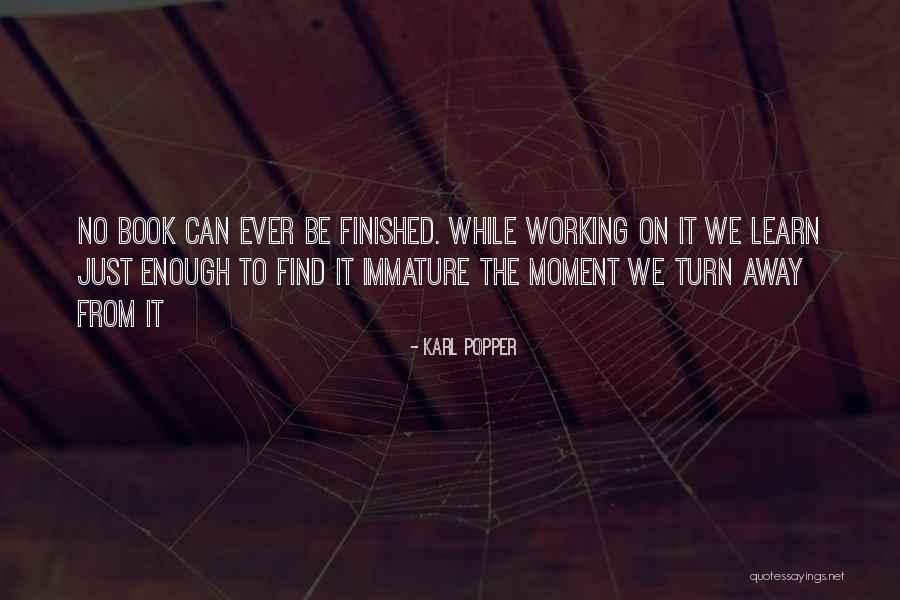
No book can ever be finished. While working on it we learn just enough to find it immature the moment we turn away from it — Karl Popper
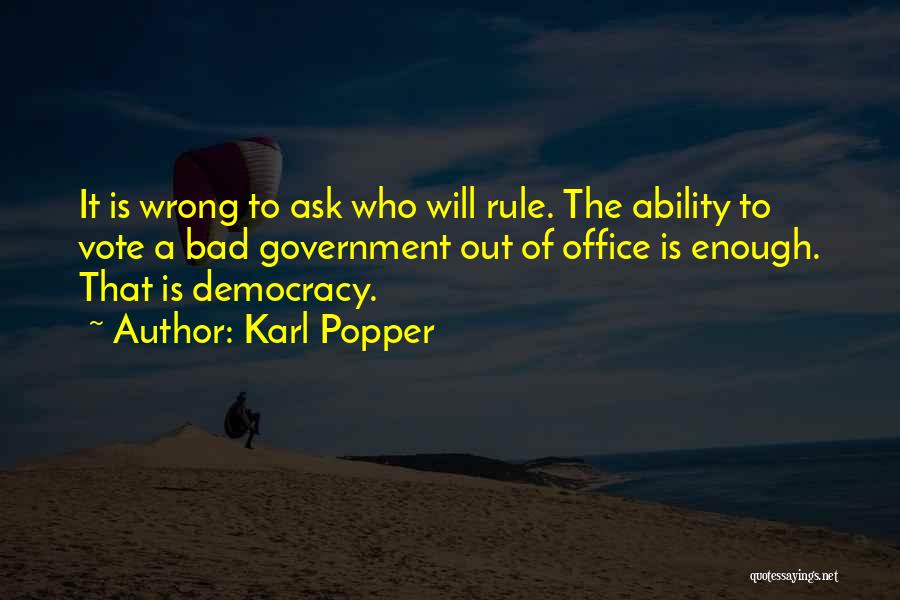
It is wrong to ask who will rule. The ability to vote a bad government out of office is enough. That is democracy. — Karl Popper
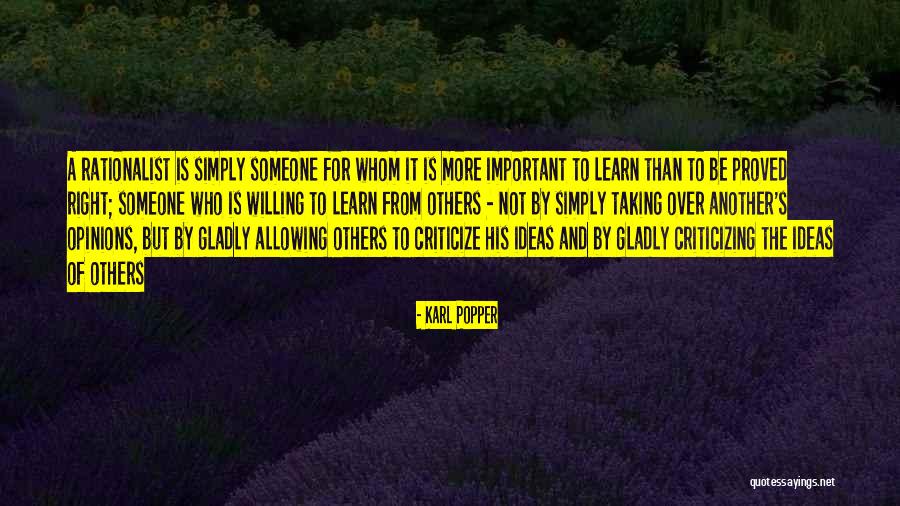
A rationalist is simply someone for whom it is more important to learn than to be proved right; someone who is willing to learn from others - not by simply taking over another's opinions, but by gladly allowing others to criticize his ideas and by gladly criticizing the ideas of others — Karl Popper
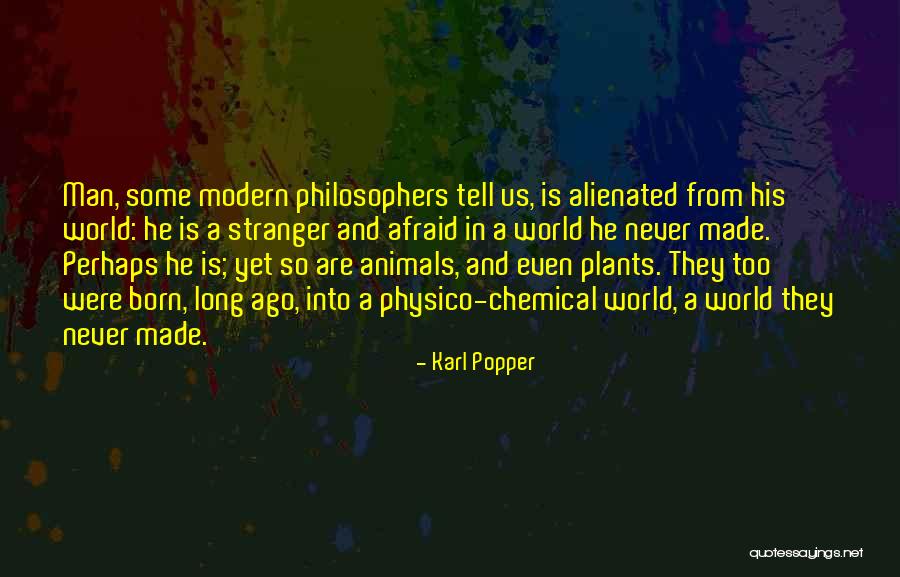
Man, some modern philosophers tell us, is alienated from his world: he is a stranger and afraid in a world he never made. Perhaps he is; yet so are animals, and even plants. They too were born, long ago, into a physico-chemical world, a world they never made. — Karl Popper
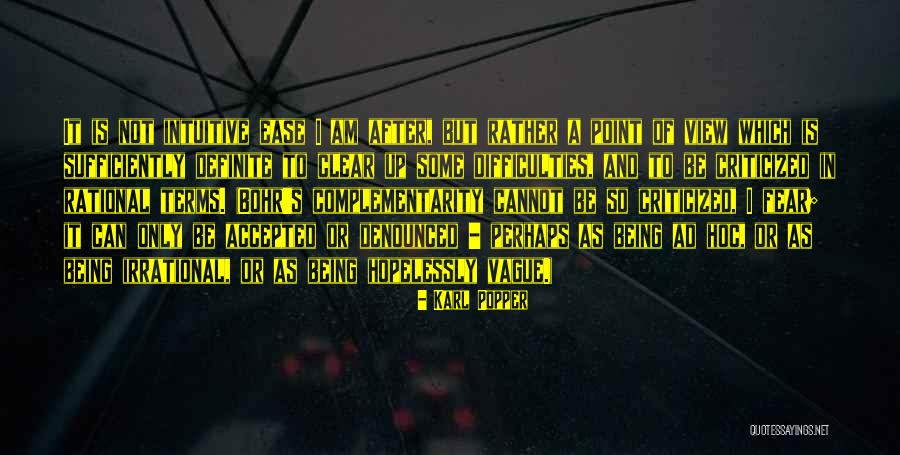
It is not intuitive ease I am after, but rather a point of view which is sufficiently definite to clear up some difficulties, and to be criticized in rational terms. (Bohr's complementarity cannot be so criticized, I fear; it can only be accepted or denounced - perhaps as being ad hoc, or as being irrational, or as being hopelessly vague.) — Karl Popper

It seems to me certain that more people are killed out of righteous stupidity than out of wickedness. — Karl Popper

Every genuine test of a theory is an attempt to falsify it, or to refute it. — Karl Popper
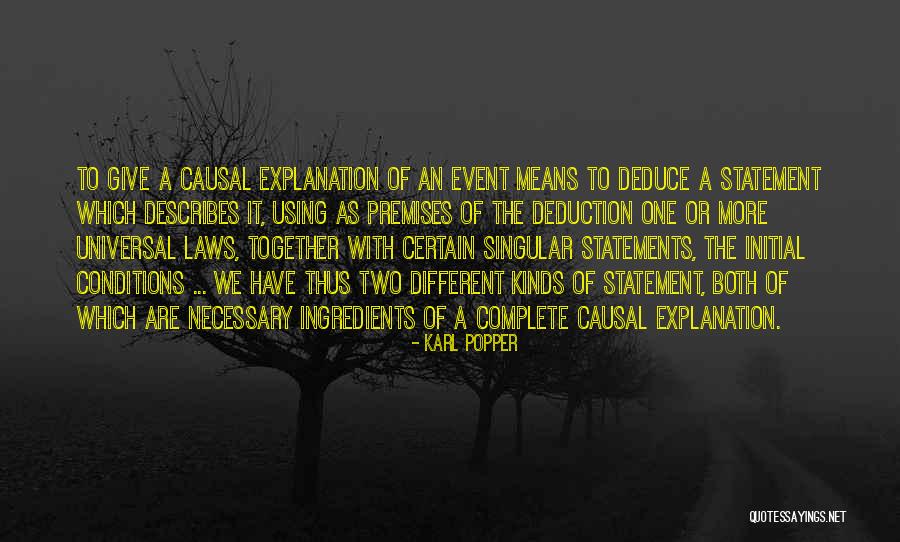
To give a causal explanation of an event means to deduce a statement which describes it, using as premises of the deduction one or more universal laws, together with certain singular statements, the initial conditions ... We have thus two different kinds of statement, both of which are necessary ingredients of a complete causal explanation. — Karl Popper
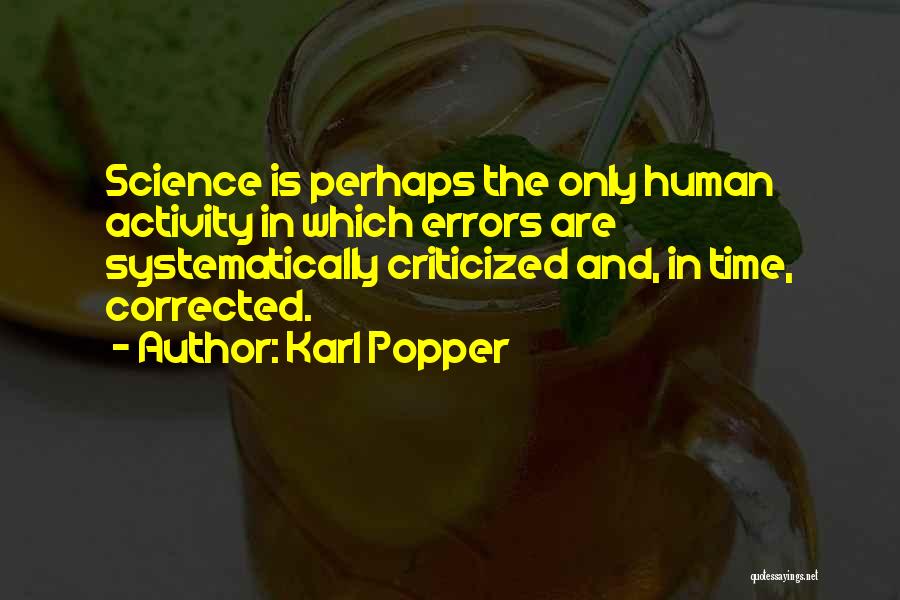
Science is perhaps the only human activity in which errors are systematically criticized and, in time, corrected. — Karl Popper
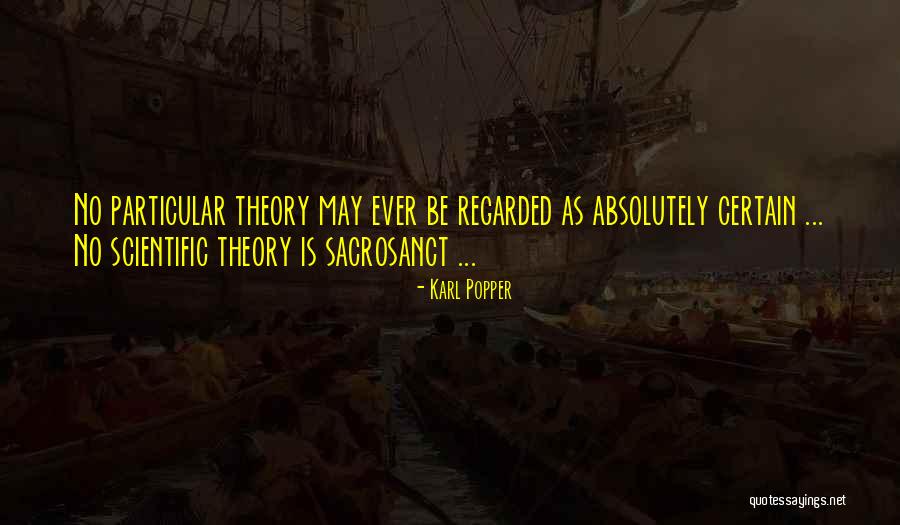
No particular theory may ever be regarded as absolutely certain ... No scientific theory is sacrosanct ... — Karl Popper
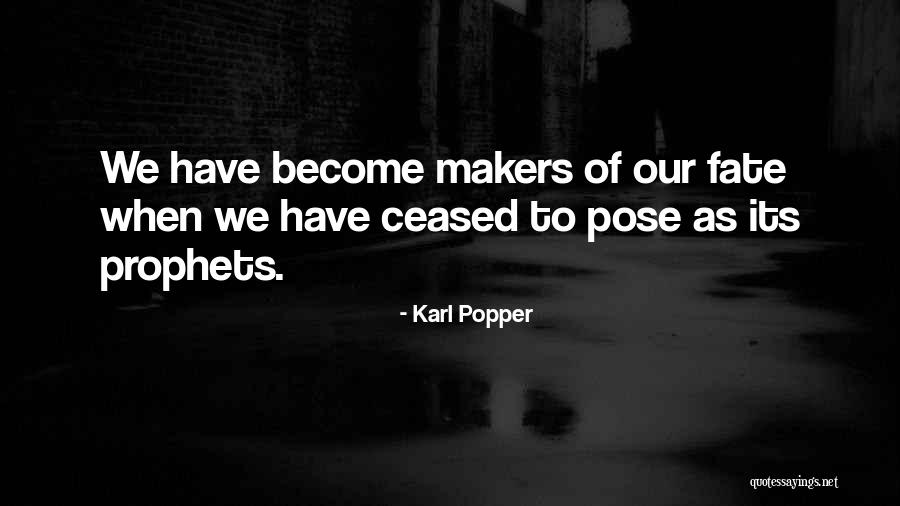
We have become makers of our fate when we have ceased to pose as its prophets. — Karl Popper
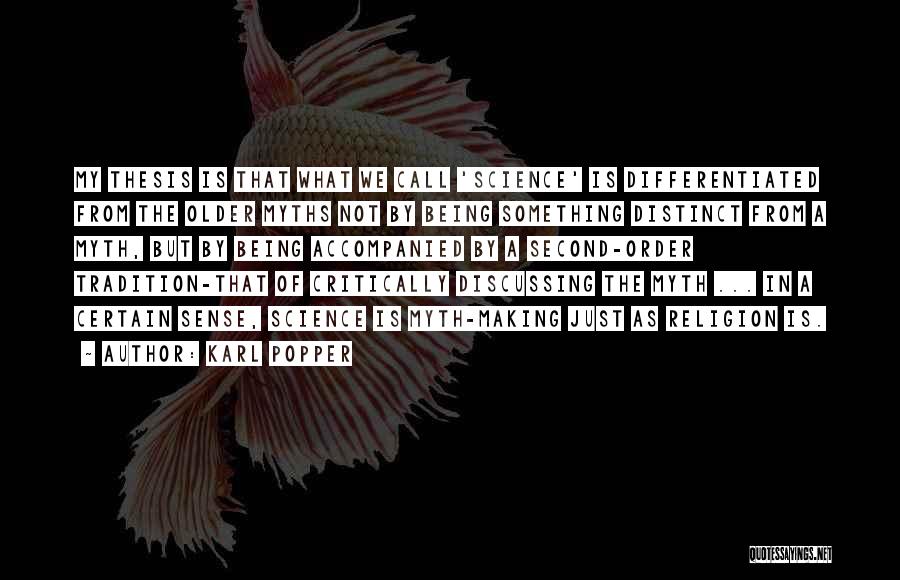
My thesis is that what we call 'science' is differentiated from the older myths not by being something distinct from a myth, but by being accompanied by a second-order tradition-that of critically discussing the myth ... In a certain sense, science is myth-making just as religion is. — Karl Popper
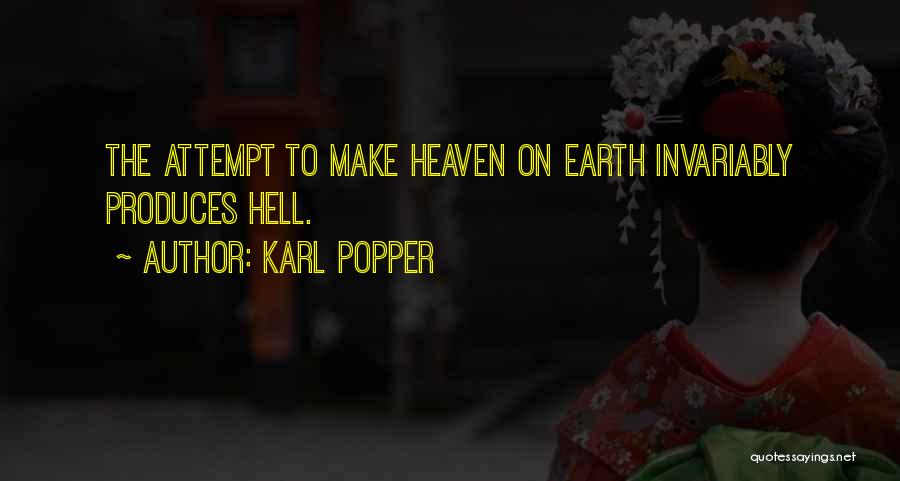
The attempt to make heaven on earth invariably produces hell. — Karl Popper
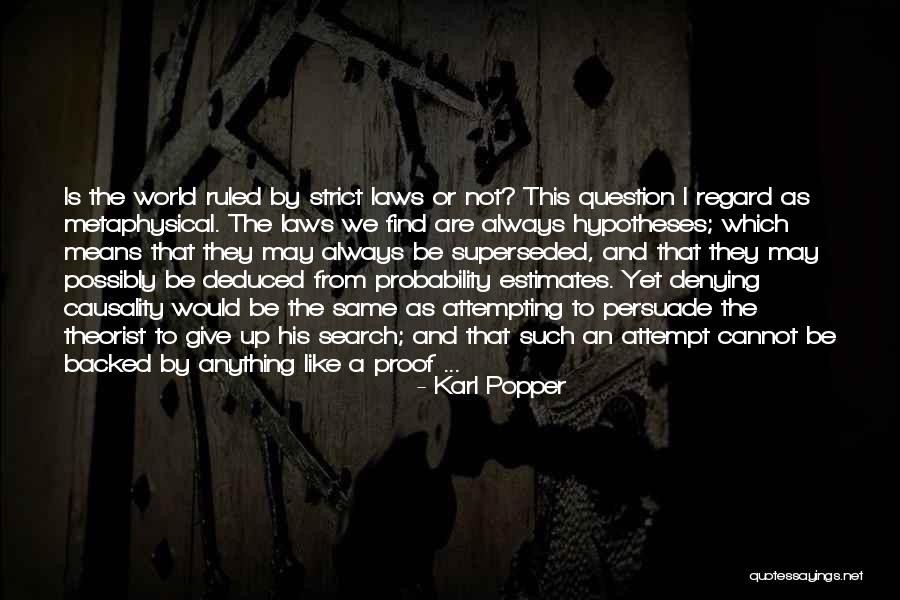
Is the world ruled by strict laws or not? This question I regard as metaphysical. The laws we find are always hypotheses; which means that they may always be superseded, and that they may possibly be deduced from probability estimates. Yet denying causality would be the same as attempting to persuade the theorist to give up his search; and that such an attempt cannot be backed by anything like a proof ... — Karl Popper
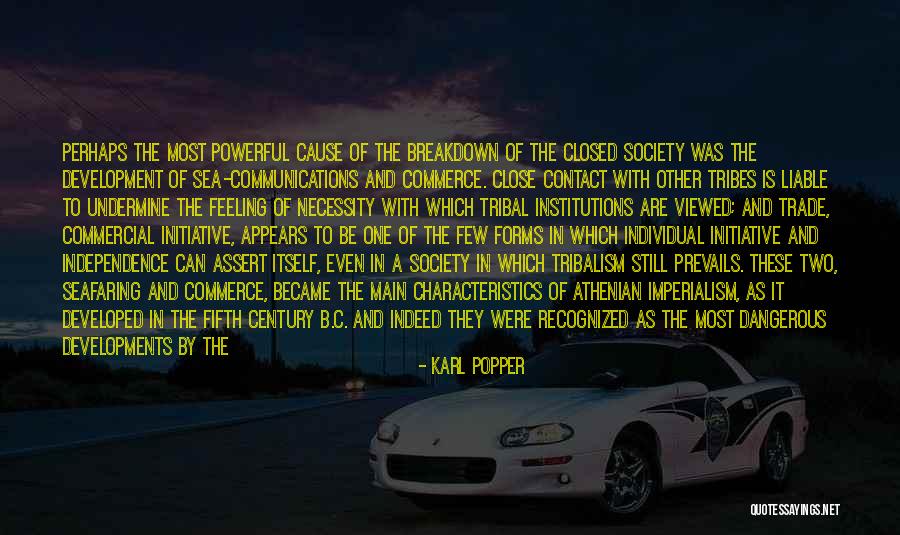
Perhaps the most powerful cause of the breakdown of the closed society was the development of sea-communications and commerce. Close contact with other tribes is liable to undermine the feeling of necessity with which tribal institutions are viewed; and trade, commercial initiative, appears to be one of the few forms in which individual initiative and independence can assert itself, even in a society in which tribalism still prevails. These two, seafaring and commerce, became the main characteristics of Athenian imperialism, as it developed in the fifth century B.C. And indeed they were recognized as the most dangerous developments by the oligarchs, the members of the privileged, or of the formerly privileged, classes of Athens. — Karl Popper
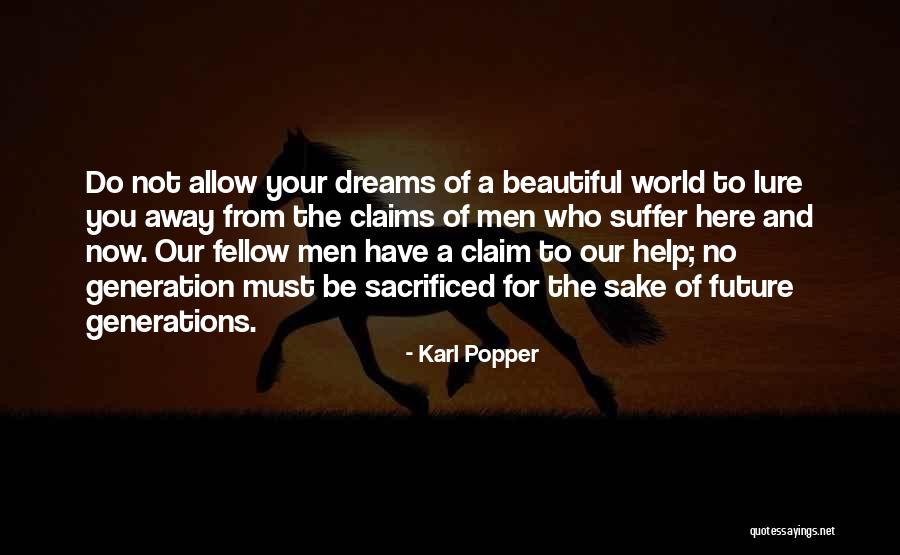
Do not allow your dreams of a beautiful world to lure you away from the claims of men who suffer here and now. Our fellow men have a claim to our help; no generation must be sacrificed for the sake of future generations. — Karl Popper
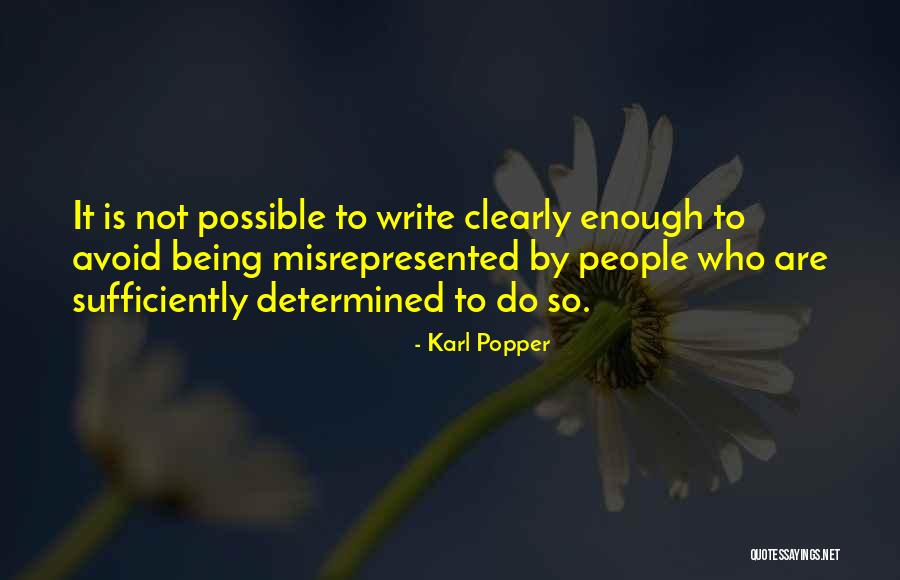
It is not possible to write clearly enough to avoid being misrepresented by people who are sufficiently determined to do so. — Karl Popper
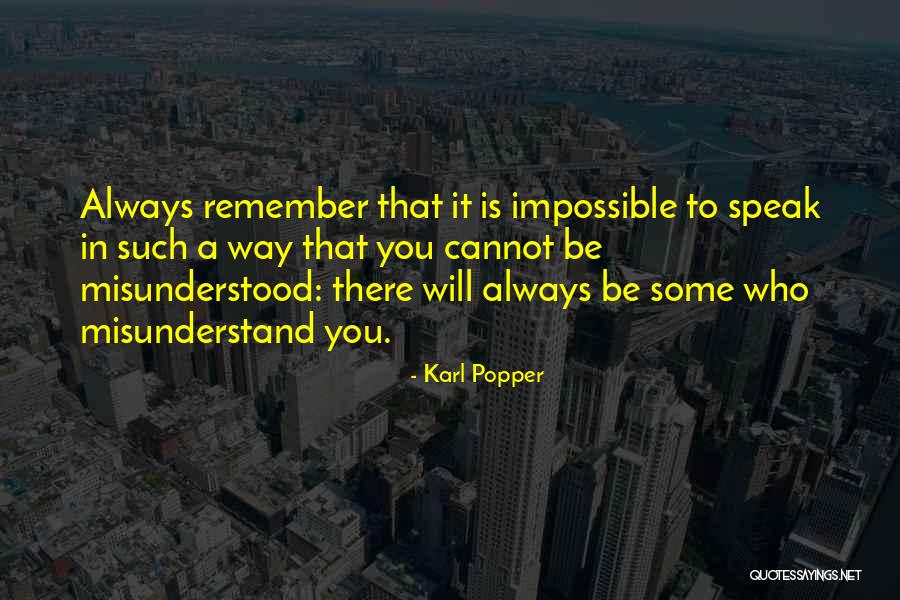
Always remember that it is impossible to speak in such a way that you cannot be misunderstood: there will always be some who misunderstand you. — Karl Popper
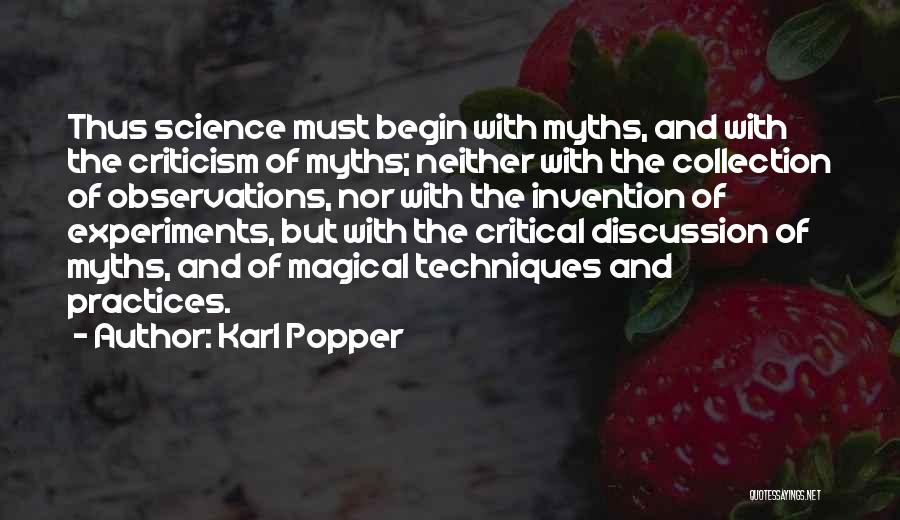
Thus science must begin with myths, and with the criticism of myths; neither with the collection of observations, nor with the invention of experiments, but with the critical discussion of myths, and of magical techniques and practices. — Karl Popper
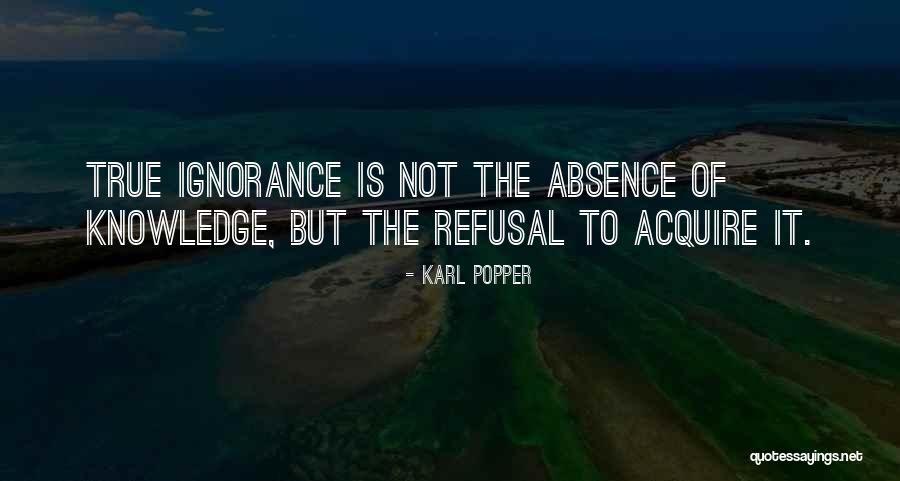
True ignorance is not the absence of knowledge, but the refusal to acquire it. — Karl Popper
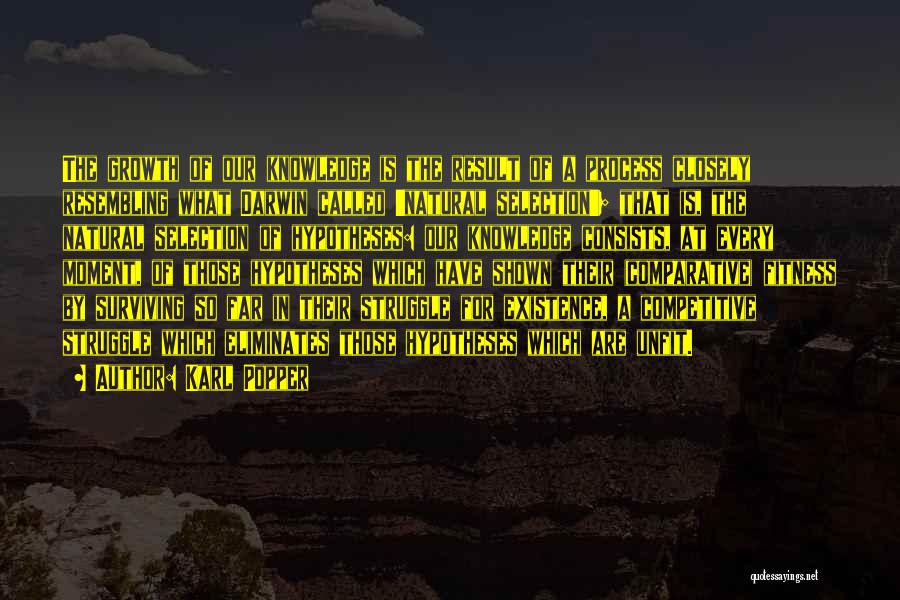
The growth of our knowledge is the result of a process closely resembling what Darwin called 'natural selection'; that is, the natural selection of hypotheses: our knowledge consists, at every moment, of those hypotheses which have shown their (comparative) fitness by surviving so far in their struggle for existence, a competitive struggle which eliminates those hypotheses which are unfit. — Karl Popper

At least some of them, I suspect, have turned to probability theory in the hope that it would give them what they had originally expected from a subjectivist or epistemological theory of the attainment of truth through verification; that is, a theory of rational and justifiable belief, based upon observed instances. — Karl Popper
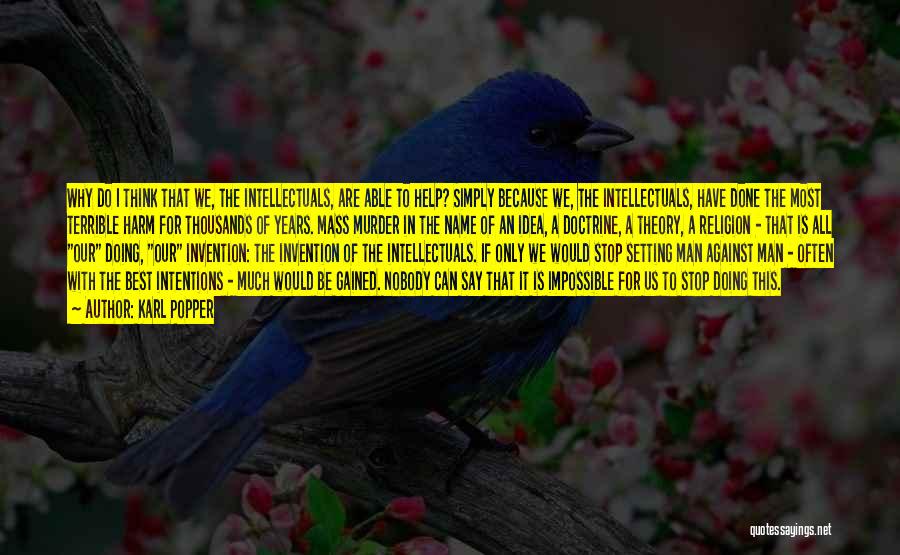
Why do I think that we, the intellectuals, are able to help? Simply because we, the intellectuals, have done the most terrible harm for thousands of years. Mass murder in the name of an idea, a doctrine, a theory, a religion - that is all "our" doing, "our" invention: the invention of the intellectuals. If only we would stop setting man against man - often with the best intentions - much would be gained. Nobody can say that it is impossible for us to stop doing this. — Karl Popper
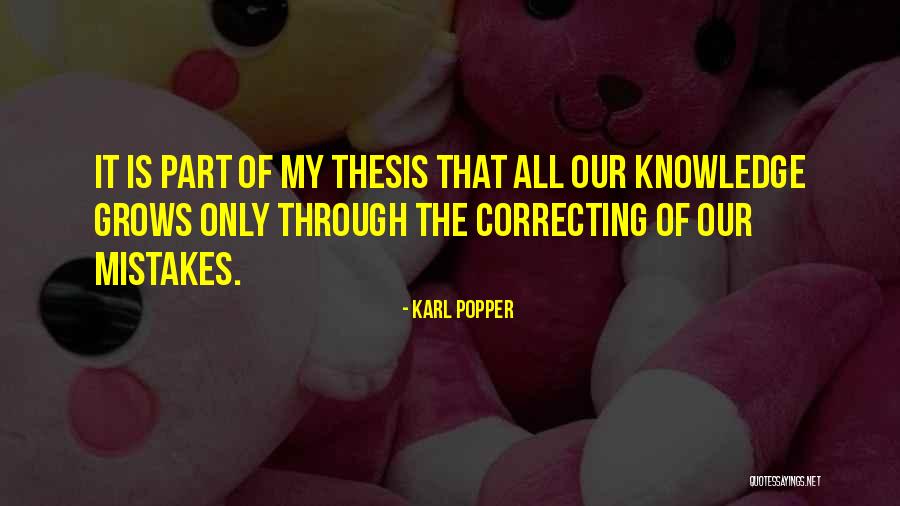
It is part of my thesis that all our knowledge grows only through the correcting of our mistakes. — Karl Popper
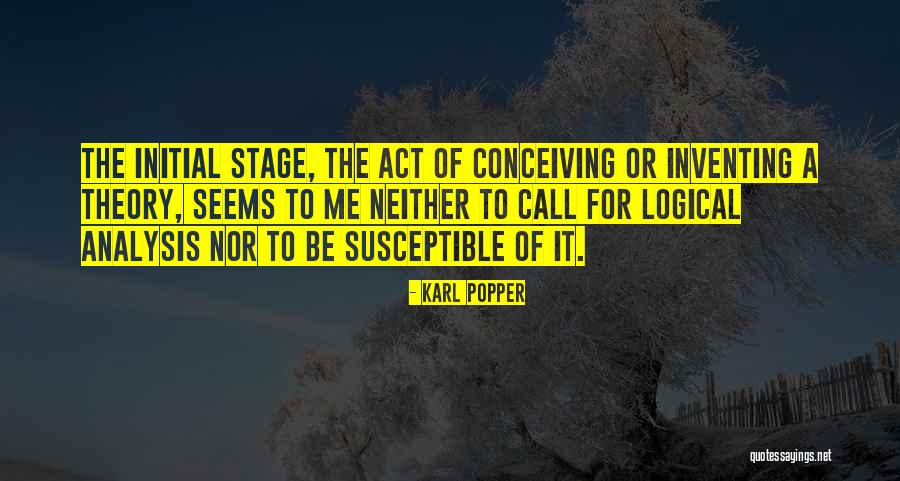
The initial stage, the act of conceiving or inventing a theory, seems to me neither to call for logical analysis nor to be susceptible of it. — Karl Popper
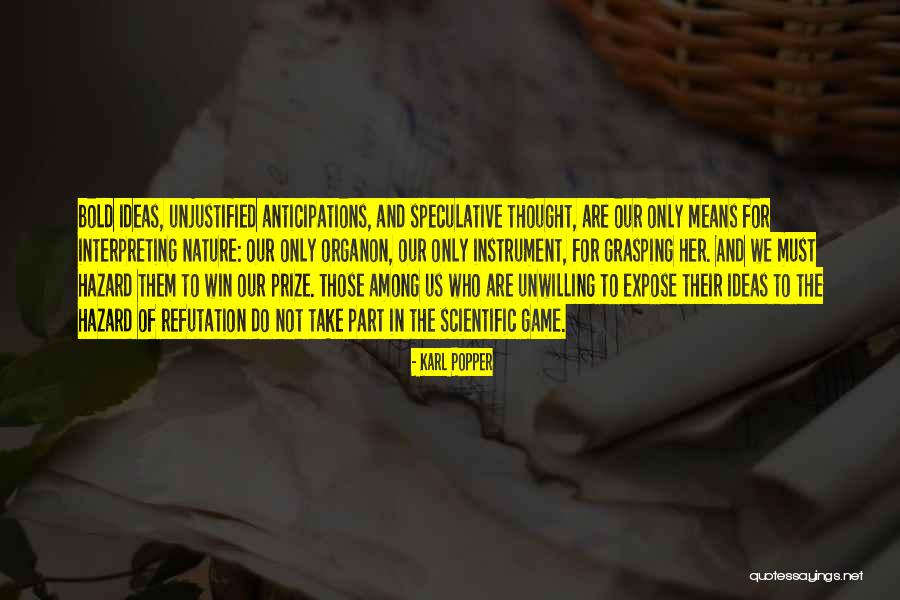
Bold ideas, unjustified anticipations, and speculative thought, are our only means for interpreting nature: our only organon, our only instrument, for grasping her. And we must hazard them to win our prize. Those among us who are unwilling to expose their ideas to the hazard of refutation do not take part in the scientific game. — Karl Popper
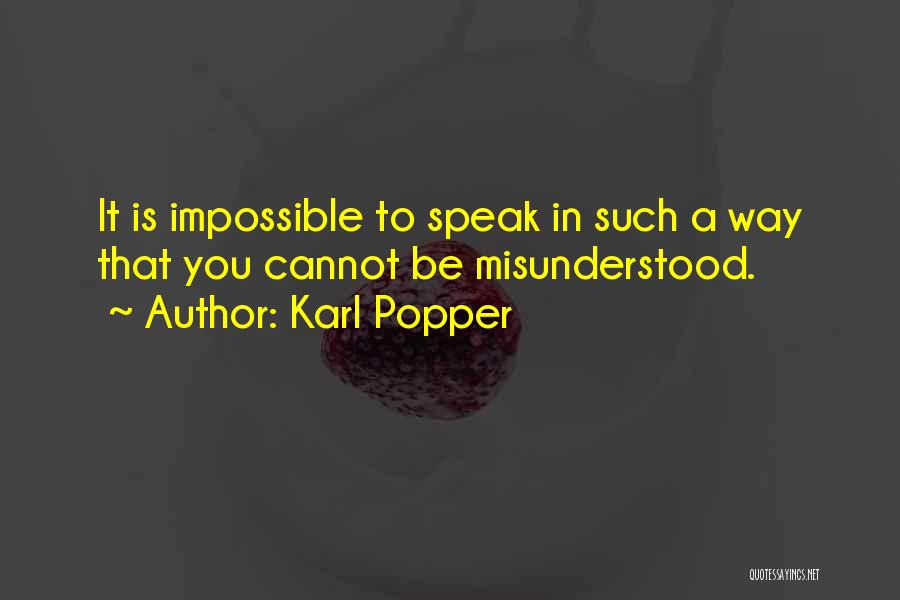
It is impossible to speak in such a way that you cannot be misunderstood. — Karl Popper
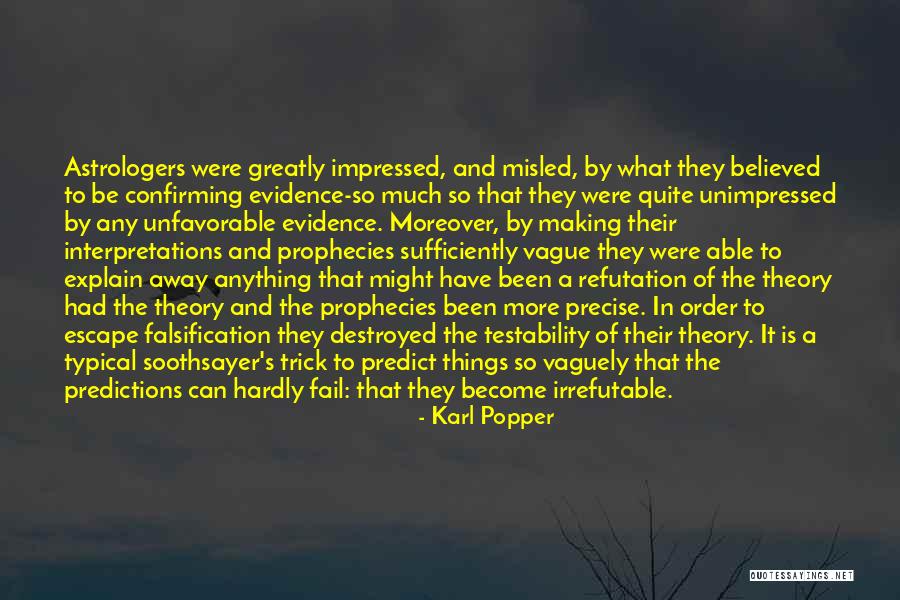
Astrologers were greatly impressed, and misled, by what they believed to be confirming evidence-so much so that they were quite unimpressed by any unfavorable evidence. Moreover, by making their interpretations and prophecies sufficiently vague they were able to explain away anything that might have been a refutation of the theory had the theory and the prophecies been more precise. In order to escape falsification they destroyed the testability of their theory. It is a typical soothsayer's trick to predict things so vaguely that the predictions can hardly fail: that they become irrefutable. — Karl Popper
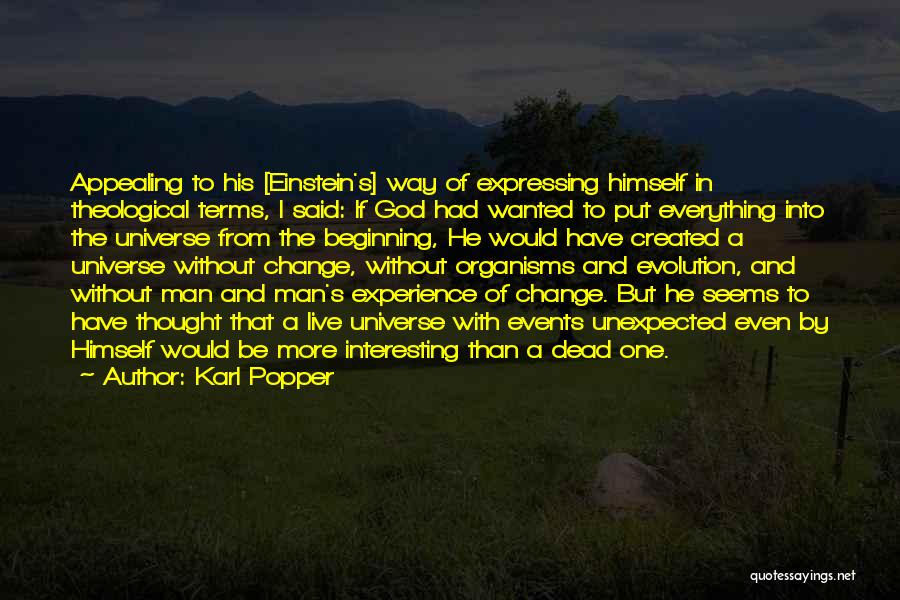
Appealing to his [Einstein's] way of expressing himself in theological terms, I said: If God had wanted to put everything into the universe from the beginning, He would have created a universe without change, without organisms and evolution, and without man and man's experience of change. But he seems to have thought that a live universe with events unexpected even by Himself would be more interesting than a dead one. — Karl Popper
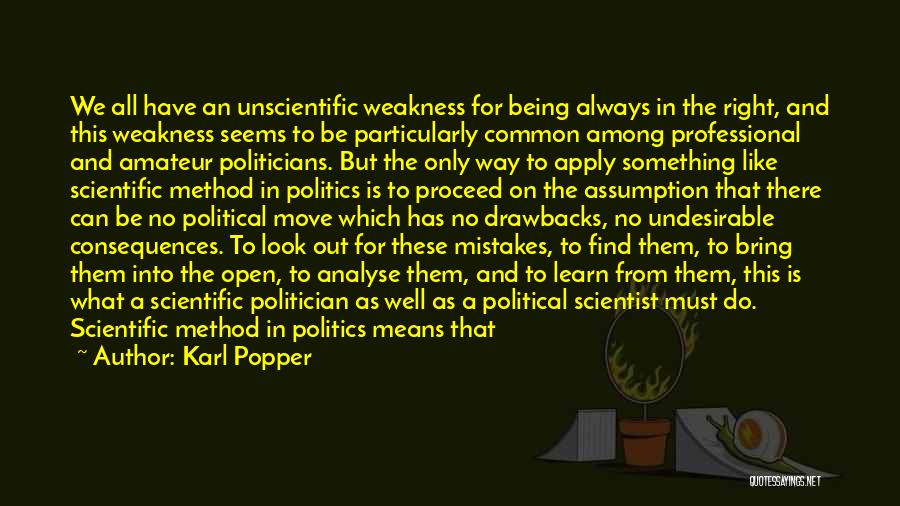
We all have an unscientific weakness for being always in the right, and this weakness seems to be particularly common among professional and amateur politicians. But the only way to apply something like scientific method in politics is to proceed on the assumption that there can be no political move which has no drawbacks, no undesirable consequences. To look out for these mistakes, to find them, to bring them into the open, to analyse them, and to learn from them, this is what a scientific politician as well as a political scientist must do. Scientific method in politics means that the great art of convincing ourselves that we have not made any mistakes, of ignoring them, of hiding them, and of blaming others from them, is replaced by the greater art of accepting the responsibility for them, of trying to learn from them, and of applying this knowledge so that we may avoid them in future. — Karl Popper
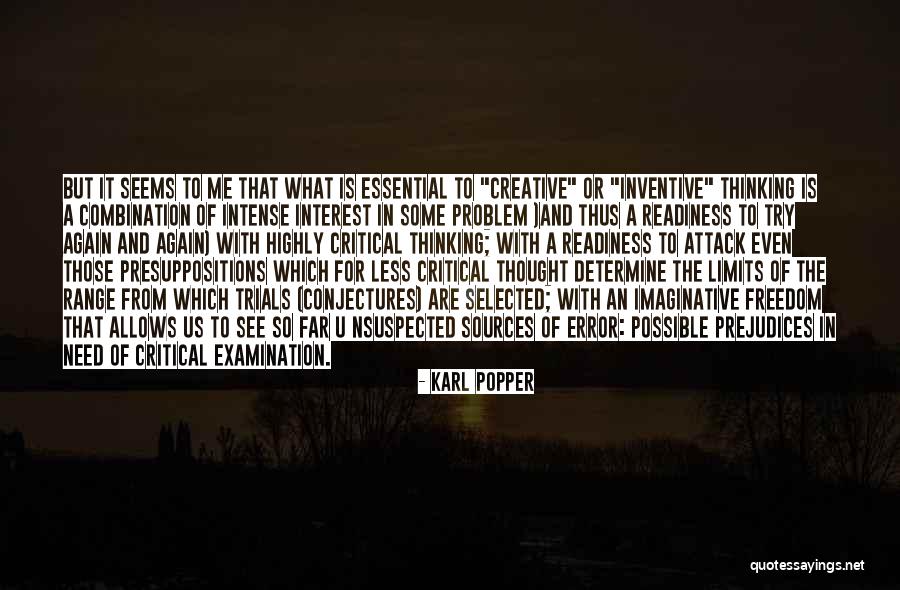
But it seems to me that what is essential to "creative" or "inventive" thinking is a combination of intense interest in some problem )and thus a readiness to try again and again) with highly critical thinking; with a readiness to attack even those presuppositions which for less critical thought determine the limits of the range from which trials (conjectures) are selected; with an imaginative freedom that allows us to see so far u nsuspected sources of error: possible prejudices in need of critical examination. — Karl Popper

The use of violence is justified only under a tyranny which makes reforms without violence impossible, and should have only one aim, that is, to bring about a state of affairs which makes reforms without violence possible. — Karl Popper
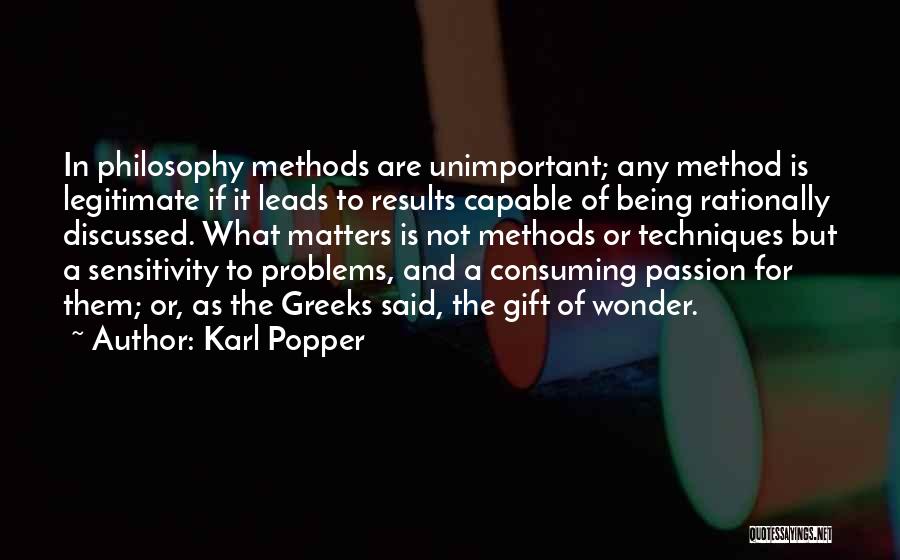
In philosophy methods are unimportant; any method is legitimate if it leads to results capable of being rationally discussed. What matters is not methods or techniques but a sensitivity to problems, and a consuming passion for them; or, as the Greeks said, the gift of wonder. — Karl Popper
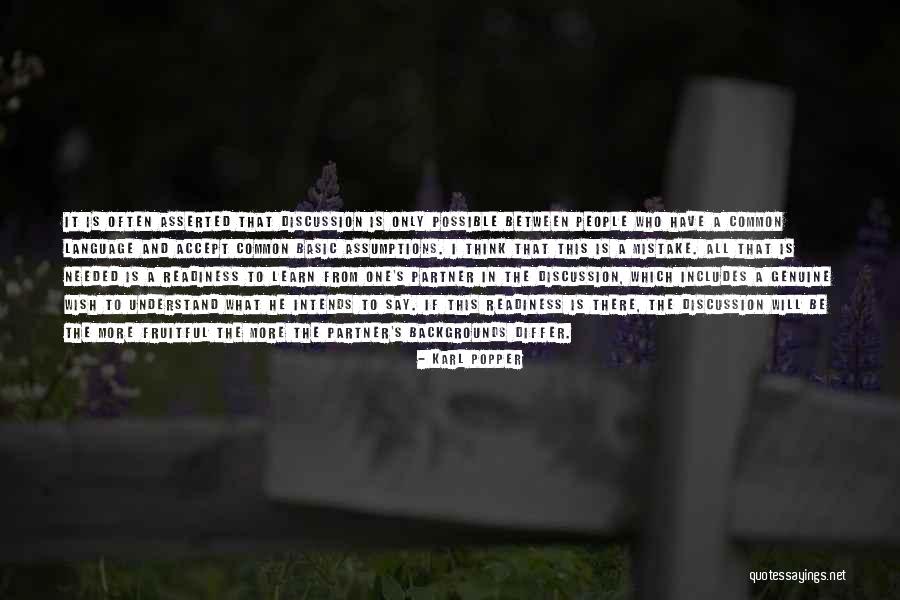
It is often asserted that discussion is only possible between people who have a common language and accept common basic assumptions. I think that this is a mistake. All that is needed is a readiness to learn from one's partner in the discussion, which includes a genuine wish to understand what he intends to say. If this readiness is there, the discussion will be the more fruitful the more the partner's backgrounds differ. — Karl Popper

There can be no ultimate statements science: there can be no statements in science which can not be tested, and therefore none which cannot in principle be refuted, by falsifying some of the conclusions which can be deduced from them. — Karl Popper
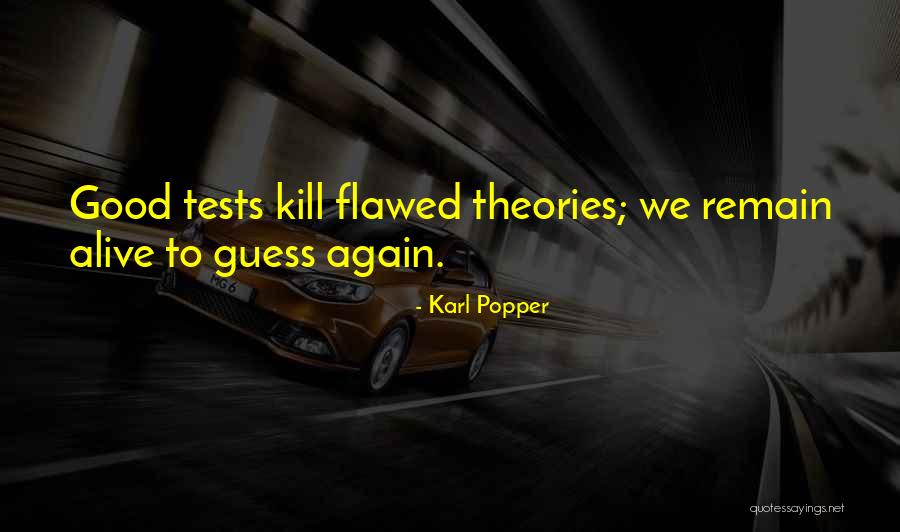
Good tests kill flawed theories; we remain alive to guess again. — Karl Popper
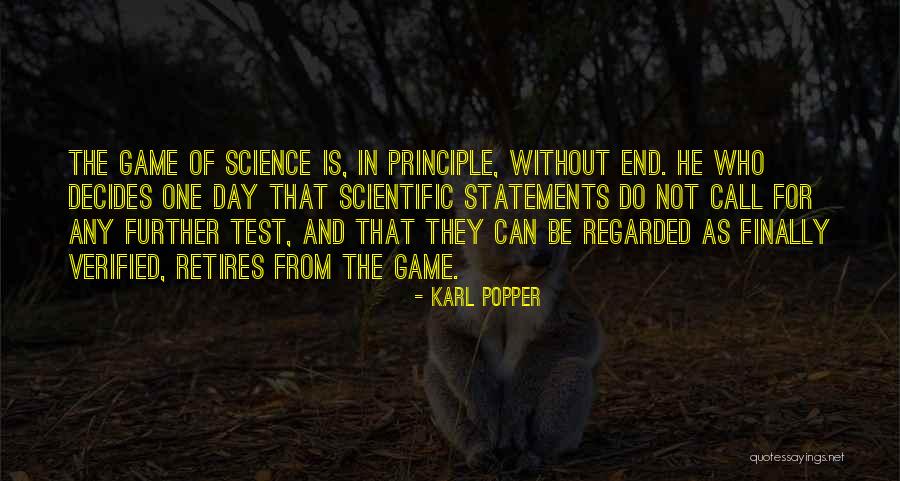
The game of science is, in principle, without end. He who decides one day that scientific statements do not call for any further test, and that they can be regarded as finally verified, retires from the game. — Karl Popper
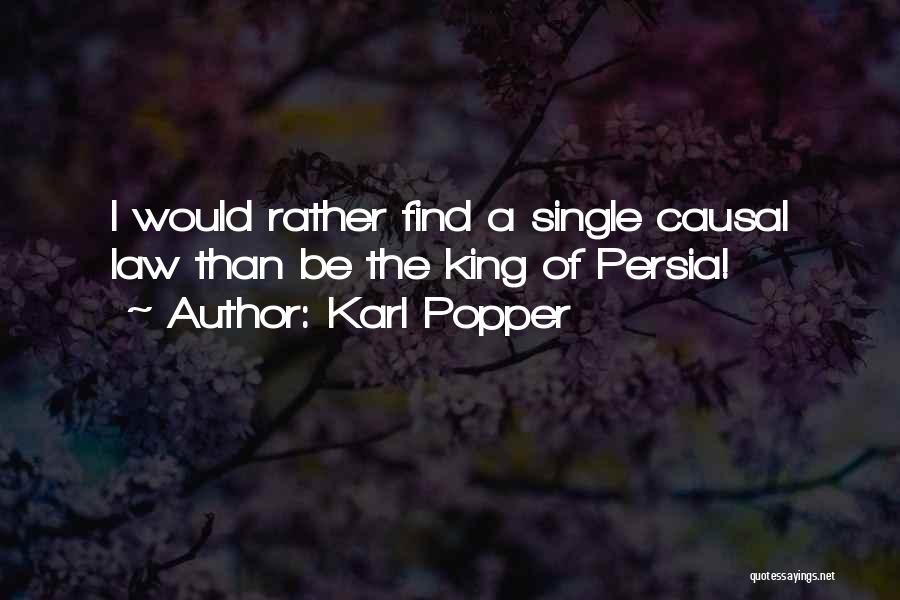
I would rather find a single causal law than be the king of Persia! — Karl Popper
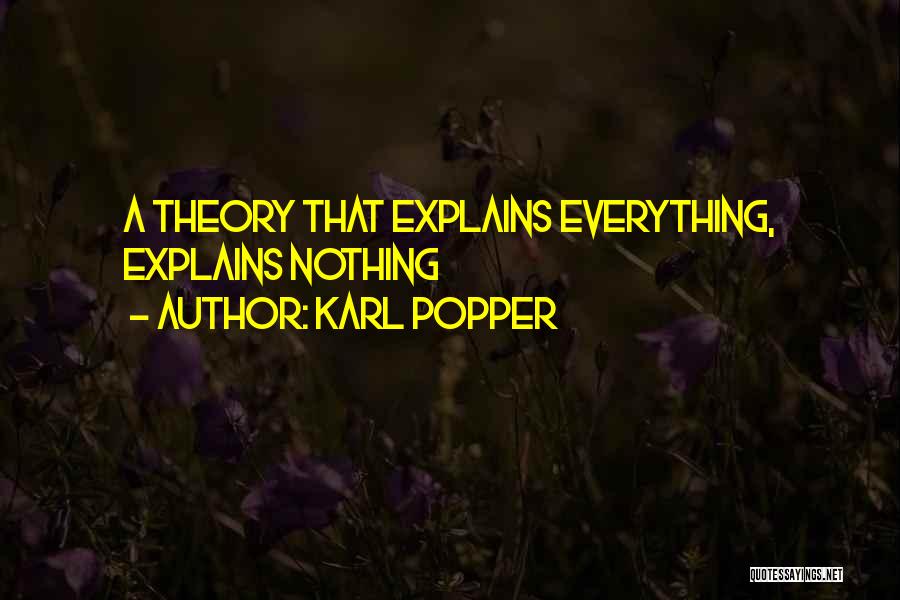
A theory that explains everything, explains nothing — Karl Popper
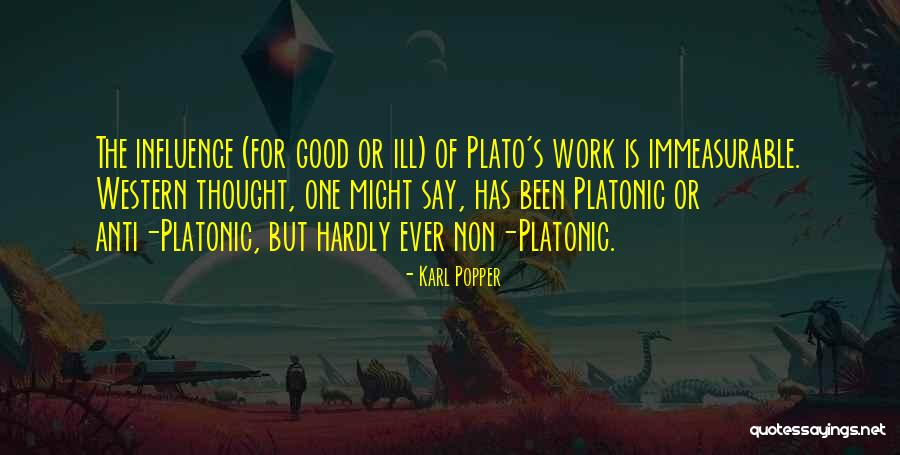
The influence (for good or ill) of Plato's work is immeasurable. Western thought, one might say, has been Platonic or anti-Platonic, but hardly ever non-Platonic. — Karl Popper
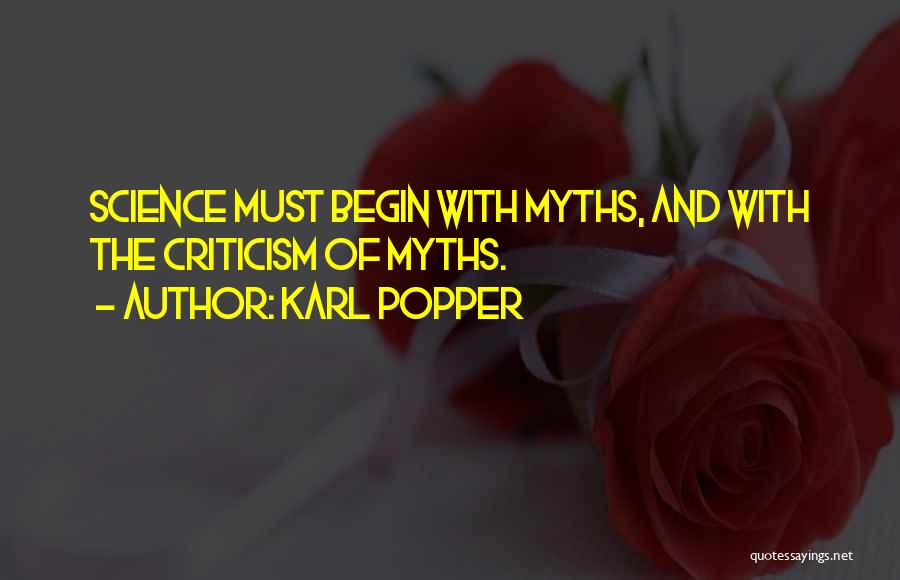
Science must begin with myths, and with the criticism of myths. — Karl Popper
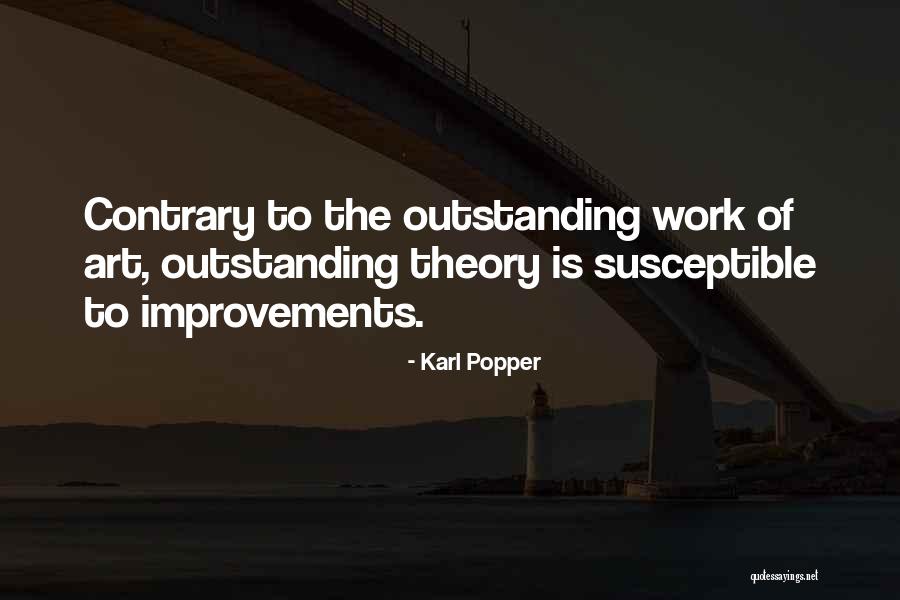
Contrary to the outstanding work of art, outstanding theory is susceptible to improvements. — Karl Popper
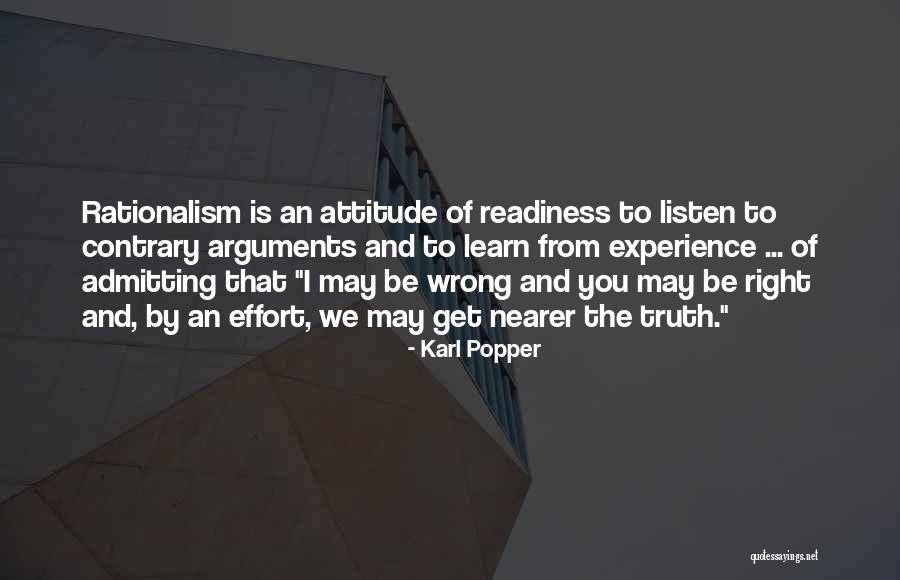
Rationalism is an attitude of readiness to listen to contrary arguments and to learn from experience ... of admitting that "I may be wrong and you may be right and, by an effort, we may get nearer the truth." — Karl Popper

Our greatest troubles spring from something that is as admirable as it is dangerous ... our impatience to better the lot of our fellows. — Karl Popper
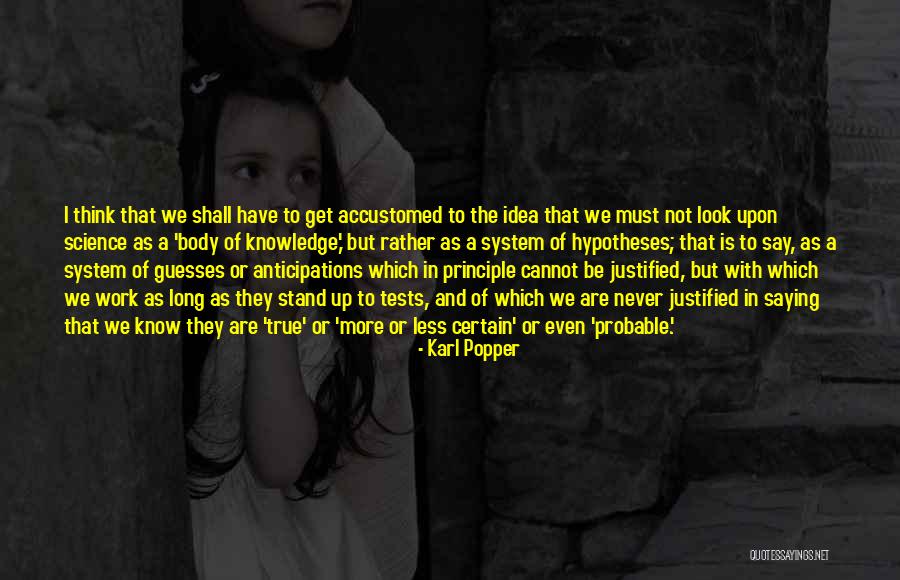
I think that we shall have to get accustomed to the idea that we must not look upon science as a 'body of knowledge,' but rather as a system of hypotheses; that is to say, as a system of guesses or anticipations which in principle cannot be justified, but with which we work as long as they stand up to tests, and of which we are never justified in saying that we know they are 'true' or 'more or less certain' or even 'probable.' — Karl Popper
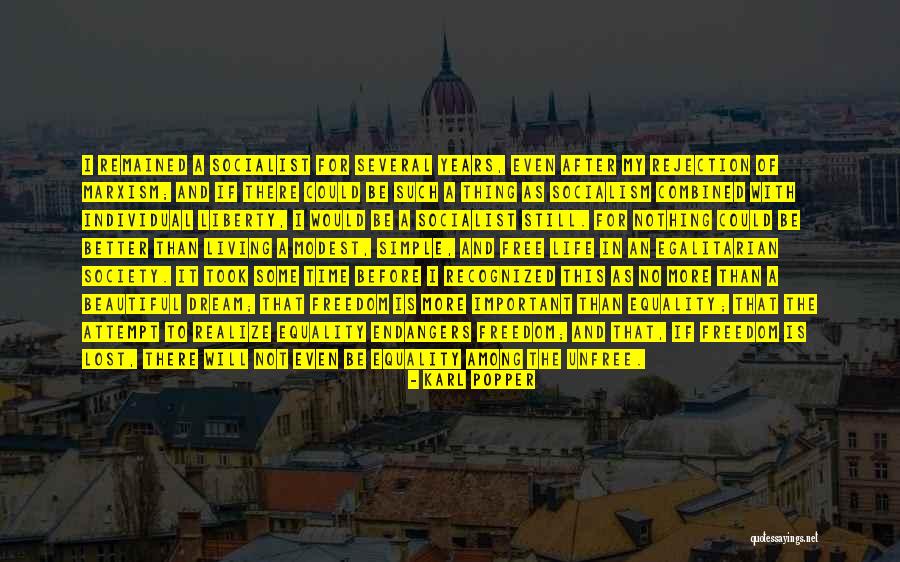
I remained a socialist for several years, even after my rejection of Marxism; and if there could be such a thing as socialism combined with individual liberty, I would be a socialist still. For nothing could be better than living a modest, simple, and free life in an egalitarian society. It took some time before I recognized this as no more than a beautiful dream; that freedom is more important than equality; that the attempt to realize equality endangers freedom; and that, if freedom is lost, there will not even be equality among the unfree. — Karl Popper
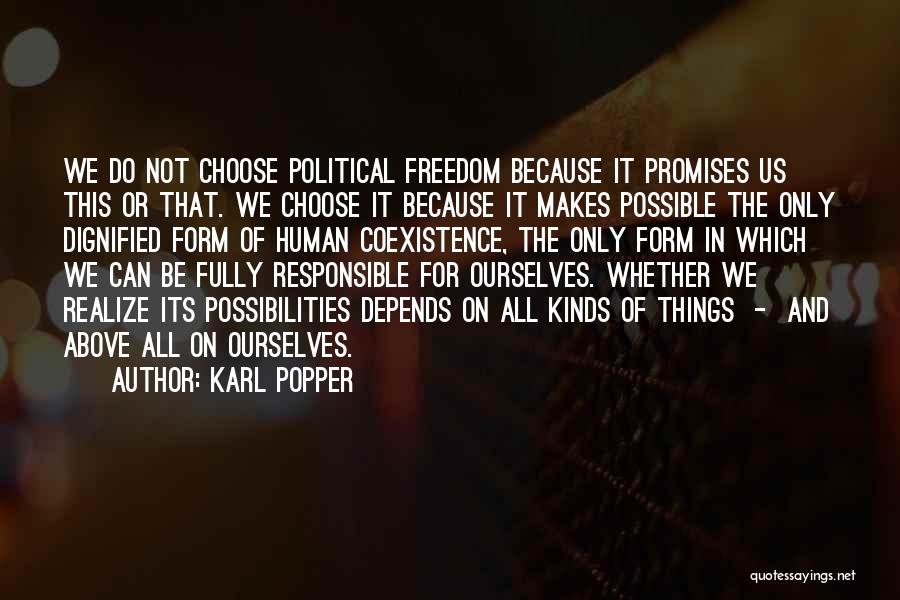
We do not choose political freedom because it promises us this or that. We choose it because it makes possible the only dignified form of human coexistence, the only form in which we can be fully responsible for ourselves. Whether we realize its possibilities depends on all kinds of things - and above all on ourselves. — Karl Popper
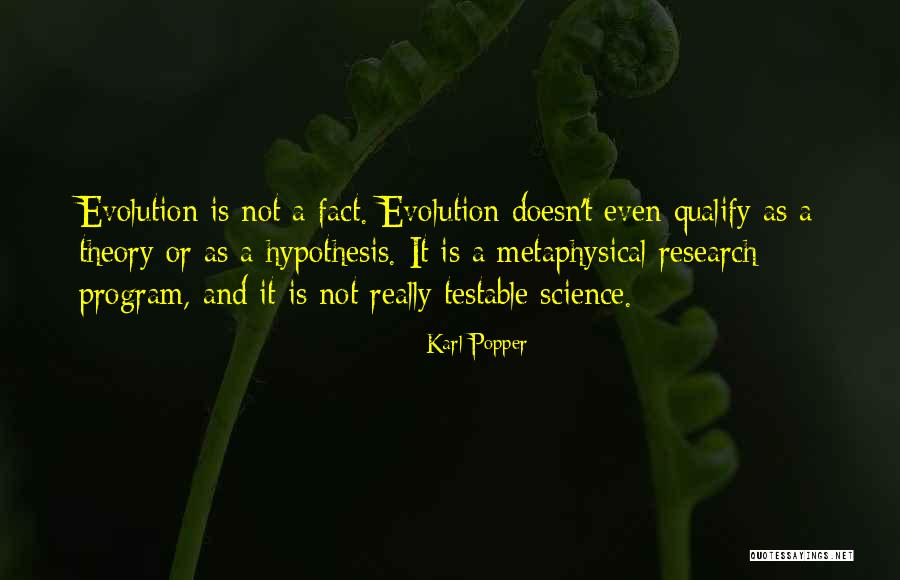
Evolution is not a fact. Evolution doesn't even qualify as a theory or as a hypothesis. It is a metaphysical research program, and it is not really testable science. — Karl Popper
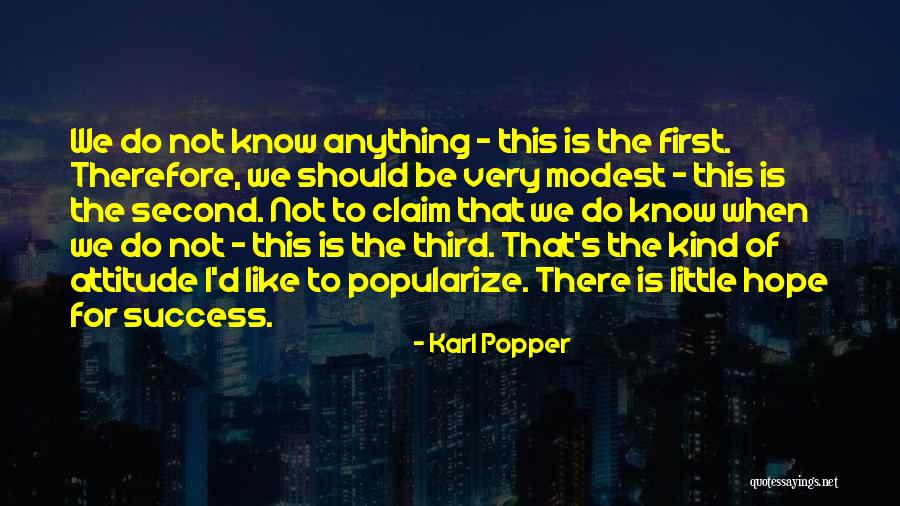
We do not know anything - this is the first. Therefore, we should be very modest - this is the second. Not to claim that we do know when we do not - this is the third. That's the kind of attitude I'd like to popularize. There is little hope for success. — Karl Popper
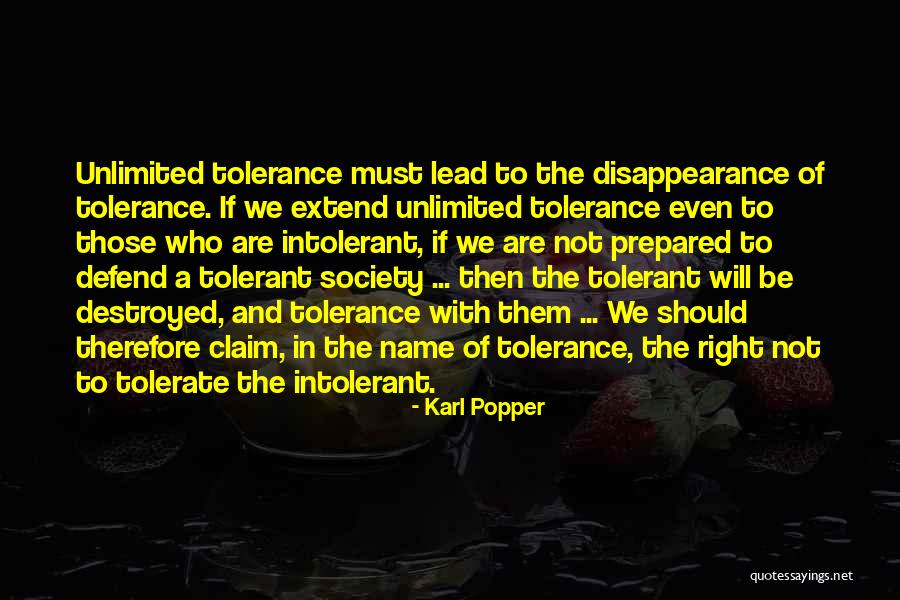
Unlimited tolerance must lead to the disappearance of tolerance. If we extend unlimited tolerance even to those who are intolerant, if we are not prepared to defend a tolerant society ... then the tolerant will be destroyed, and tolerance with them ... We should therefore claim, in the name of tolerance, the right not to tolerate the intolerant. — Karl Popper
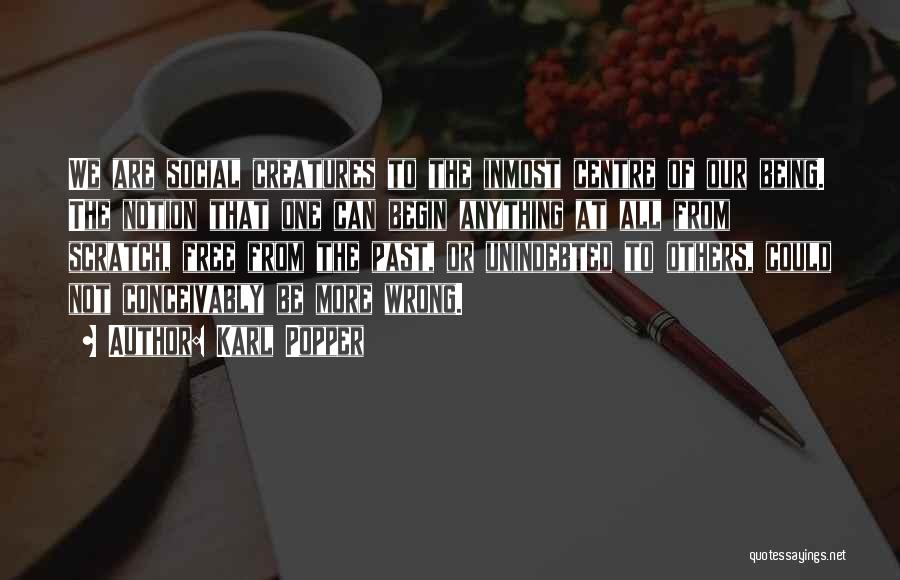
We are social creatures to the inmost centre of our being. The notion that one can begin anything at all from scratch, free from the past, or unindebted to others, could not conceivably be more wrong. — Karl Popper
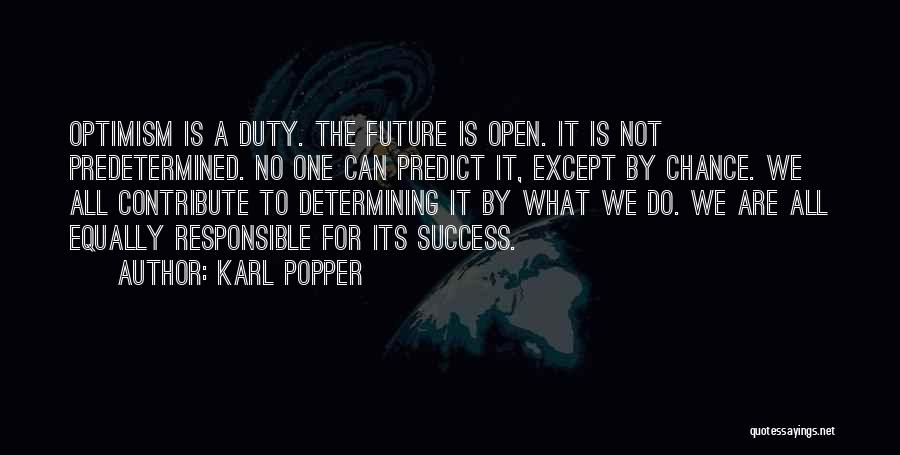
Optimism is a duty. The future is open. It is not predetermined. No one can predict it, except by chance. We all contribute to determining it by what we do. We are all equally responsible for its success. — Karl Popper
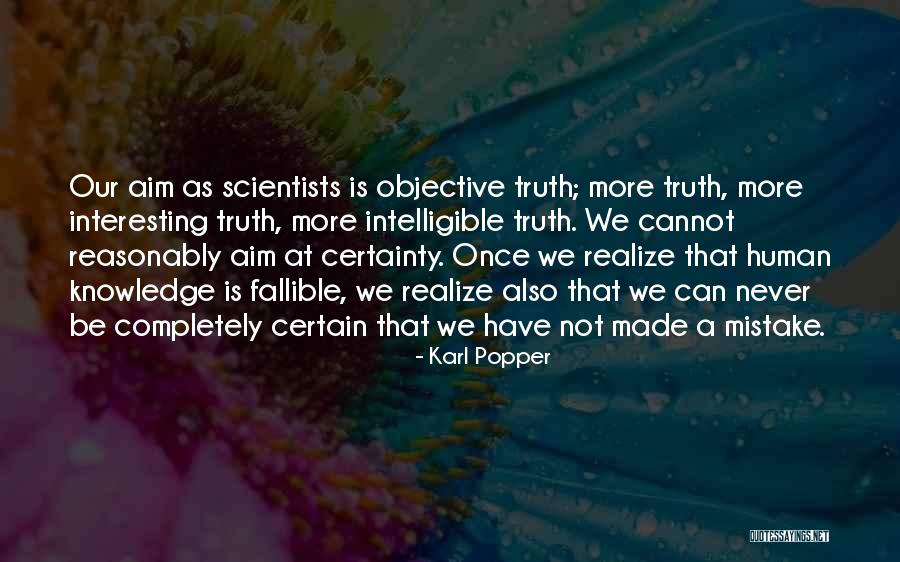
Our aim as scientists is objective truth; more truth, more interesting truth, more intelligible truth. We cannot reasonably aim at certainty. Once we realize that human knowledge is fallible, we realize also that we can never be completely certain that we have not made a mistake. — Karl Popper
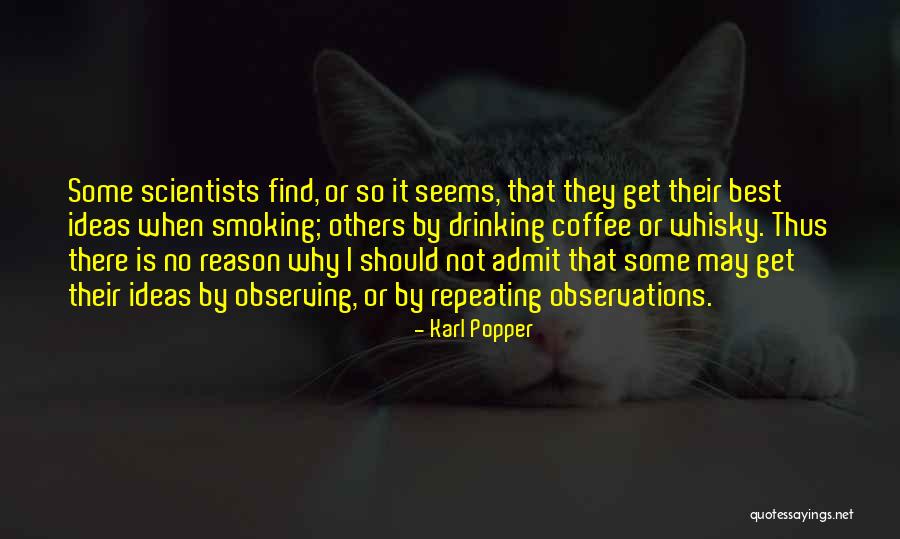
Some scientists find, or so it seems, that they get their best ideas when smoking; others by drinking coffee or whisky. Thus there is no reason why I should not admit that some may get their ideas by observing, or by repeating observations. — Karl Popper

If you can't say it simply and clearly, keep quiet, and keep working on it till you can. — Karl Popper
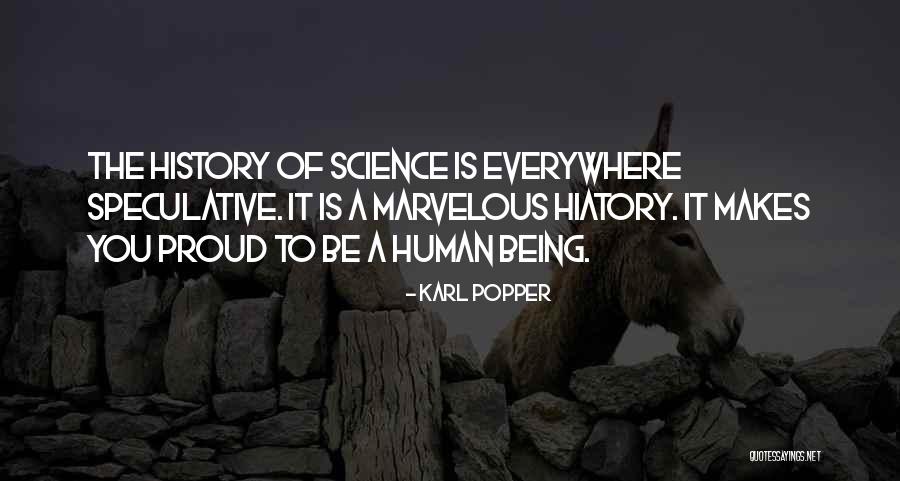
The history of science is everywhere speculative. It is a marvelous hiatory. It makes you proud to be a human being. — Karl Popper
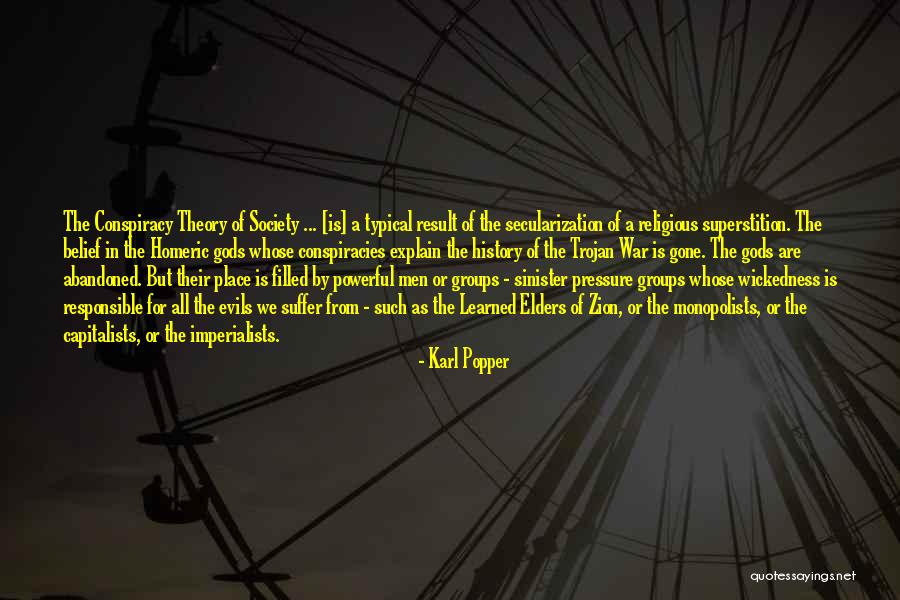
The Conspiracy Theory of Society ... [is] a typical result of the secularization of a religious superstition. The belief in the Homeric gods whose conspiracies explain the history of the Trojan War is gone. The gods are abandoned. But their place is filled by powerful men or groups - sinister pressure groups whose wickedness is responsible for all the evils we suffer from - such as the Learned Elders of Zion, or the monopolists, or the capitalists, or the imperialists. — Karl Popper
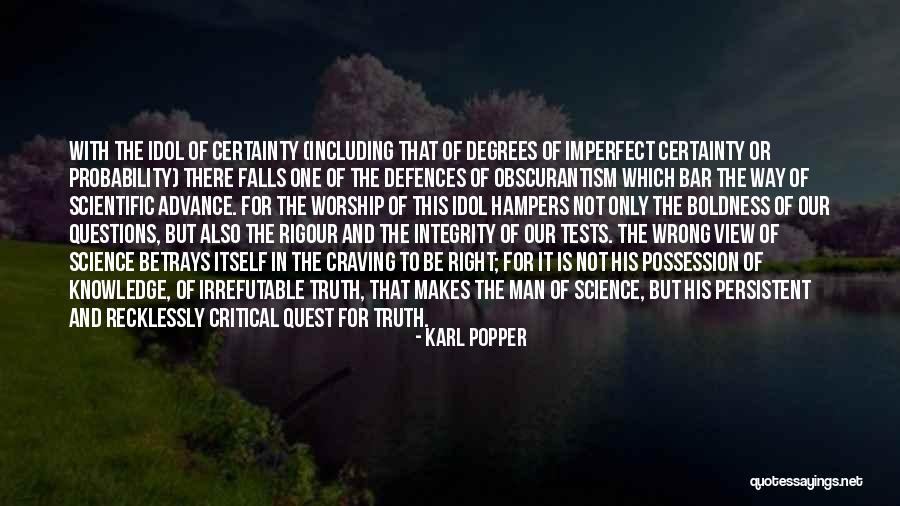
With the idol of certainty (including that of degrees of imperfect certainty or probability) there falls one of the defences of obscurantism which bar the way of scientific advance. For the worship of this idol hampers not only the boldness of our questions, but also the rigour and the integrity of our tests. The wrong view of science betrays itself in the craving to be right; for it is not his possession of knowledge, of irrefutable truth, that makes the man of science, but his persistent and recklessly critical quest for truth. — Karl Popper
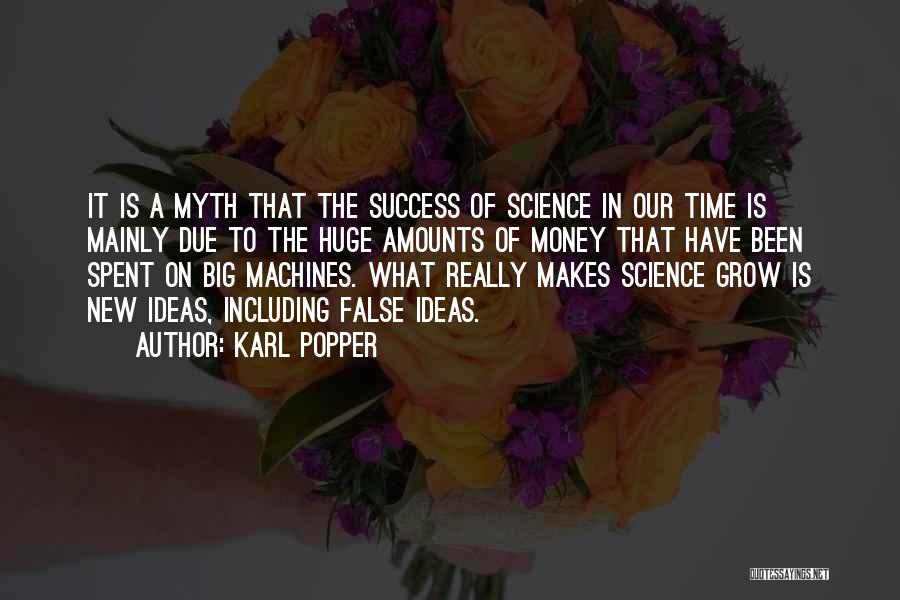
It is a myth that the success of science in our time is mainly due to the huge amounts of money that have been spent on big machines. What really makes science grow is new ideas, including false ideas. — Karl Popper
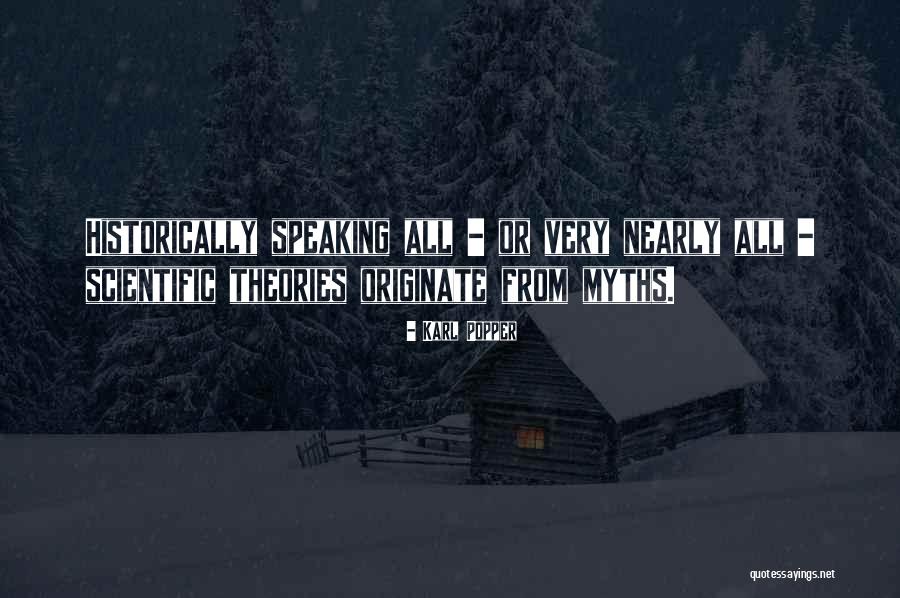
Historically speaking all - or very nearly all - scientific theories originate from myths. — Karl Popper
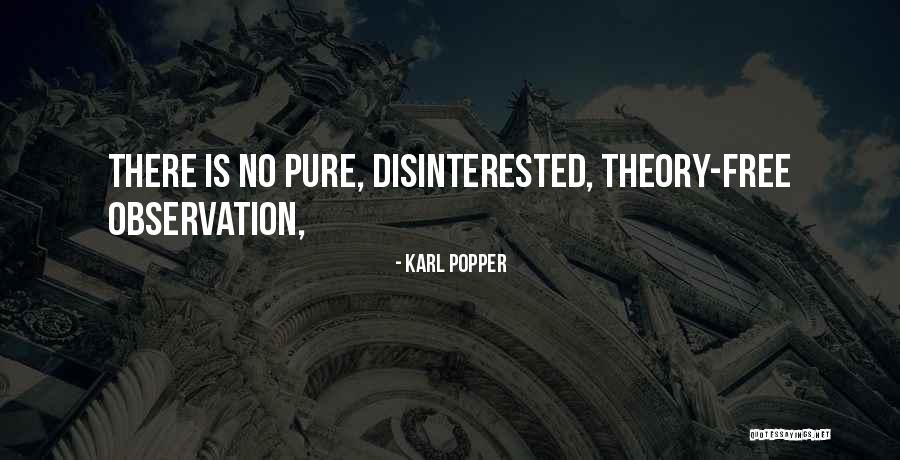
There is no pure, disinterested, theory-free observation, — Karl Popper
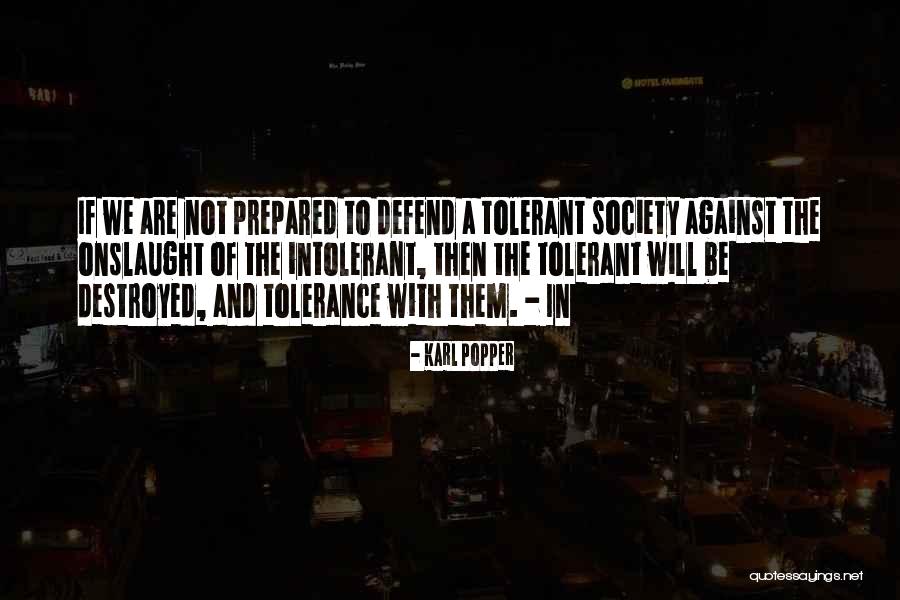
If we are not prepared to defend a tolerant society against the onslaught of the intolerant, then the tolerant will be destroyed, and tolerance with them. - In — Karl Popper
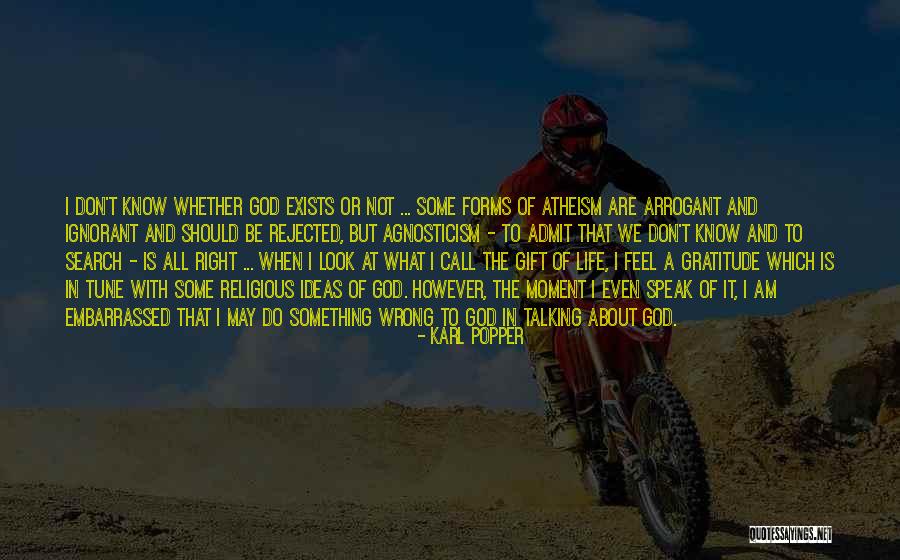
I don't know whether God exists or not ... Some forms of atheism are arrogant and ignorant and should be rejected, but agnosticism - to admit that we don't know and to search - is all right ... When I look at what I call the gift of life, I feel a gratitude which is in tune with some religious ideas of God. However, the moment I even speak of it, I am embarrassed that I may do something wrong to God in talking about God. — Karl Popper
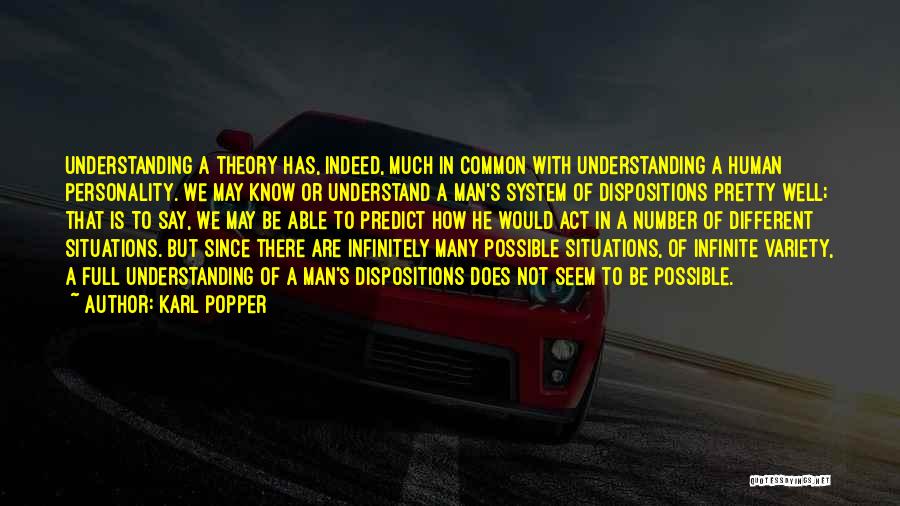
Understanding a theory has, indeed, much in common with understanding a human personality. We may know or understand a man's system of dispositions pretty well; that is to say, we may be able to predict how he would act in a number of different situations. But since there are infinitely many possible situations, of infinite variety, a full understanding of a man's dispositions does not seem to be possible. — Karl Popper

We can all participate in the heritage of man. We all can help to preserve it. And we can all make our own modest contribution to it.
We must not as for more. — Karl Popper
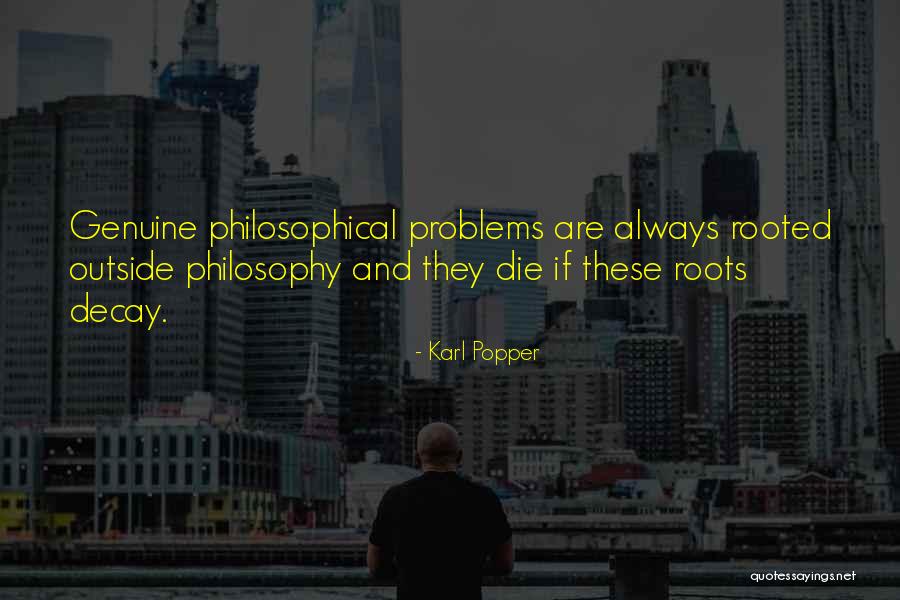
Genuine philosophical problems are always rooted outside philosophy and they die if these roots decay. — Karl Popper






